An Exiles Writings
John Locke – A Letter Concerning Toleration
Writing on the matter of religious toleration, it may seem Locke was simply interested in advocating for the rights or liberties of religious minorities. Yet, during a time when monarchs asserted their devine right to rule, such writings were far from being narrow in nature.
Introduction
John Locke’s A Letter Concerning Toleration was written in Latin in 1685, while the author was in exile in Holland. Locke had fled to Holland following the exposure of the so-called “Rye House Plot.” Though historians now doubt the extent to which the Plot was real, many of Locke’s close associates were implicated for treason in connection to the Plot, prompting him to flee England for his personal safety. He would not return until after the Glorious Revolution of 1689, when William of Orange and his wife Mary Stuart replaced the deposed James II as the king and queen of England. A Letter Concerning Toleration was first published in 1689, in both English and Latin, following the ascent of William and Mary to the throne of England.
Locke’s Letter urged religious toleration during a crucial time. In 1685, the same year that Locke penned the Letter, Catholic King Louis XIV of France had revoked the Edict of Nantes, which had granted limited rights and protections to Huguenots (French Protestants). As a result of this revocation, thousands of French protestants fled the country, and those that remained were subjected to intense persecutions. In 1689, the year the Letter was published in England, the English Parliament ruled in favor of “The Act of Toleration,” a statutory toleration for Protestant dissenters. Locke’s ideas about toleration argued against government involvement in matters of religion, advocated for a separation of Church and state and rejected absolutism. Below are several excerpts from Locke’s Letter Concerning Toleration in which Locke rejects the government’s involvement in religion. Does Locke believe that there is any one true religion? If so, does this affect his position on religious toleration? How might Locke have felt about Catholicism? What connections can be drawn between Catholicism and Absolutism?
Rachael Edmonston
Further Reading
John Locke:
A Letter Concerning Toleration:
- Locke, John. A Letter Concerning Toleration and Other Writings. Edited by Mark Goldie. The Thomas Hollis Library. Indianapolis: Liberty Fund, 2010. http://oll.libertyfund.org/titles/locke-a-letter-concerning-toleration-and-other-writings
“Act of Toleration” (1689):
- https://www.ssc.wisc.edu/~rkeyser/wp/wp-content/uploads/2015/06/TolerationAct1689.pdf
- https://www.encyclopediavirginia.org/Act_of_Toleration_1689
Edict of Fontainebleau (revocation of Edict of Nantes):
- Perry, Elisabeth Israels. From Theology to History: French Religious Controversy and the Revocation of the Edict of Nantes. International Archives of the History of Ideas, 67. The Hague: M. Nijhoff, 1973.
Other Works by John Locke:
- Two Treatises of Government
- An Essay Concerning Human Understanding
- Some Thoughts Concerning Education
- Two Tracts on Government
- An Essay For the Understanding Of St. Paul’s Epistles By Consulting St. Paul Himself
Sources
- John Locke. A Letter Concerning Toleration. (London: Printed for Awnsham Churchill, 1689).
- Collection of the Library of Congress. BR1610 .L8.
- Transcription by Michael Becker and Dylan Bails.
Cite this page
Content Warning
Some of the works in this project contain racist and offensive language and descriptions that may be difficult or disturbing to read. Please take care when reading these materials, and see our Ethics Statement and About page.
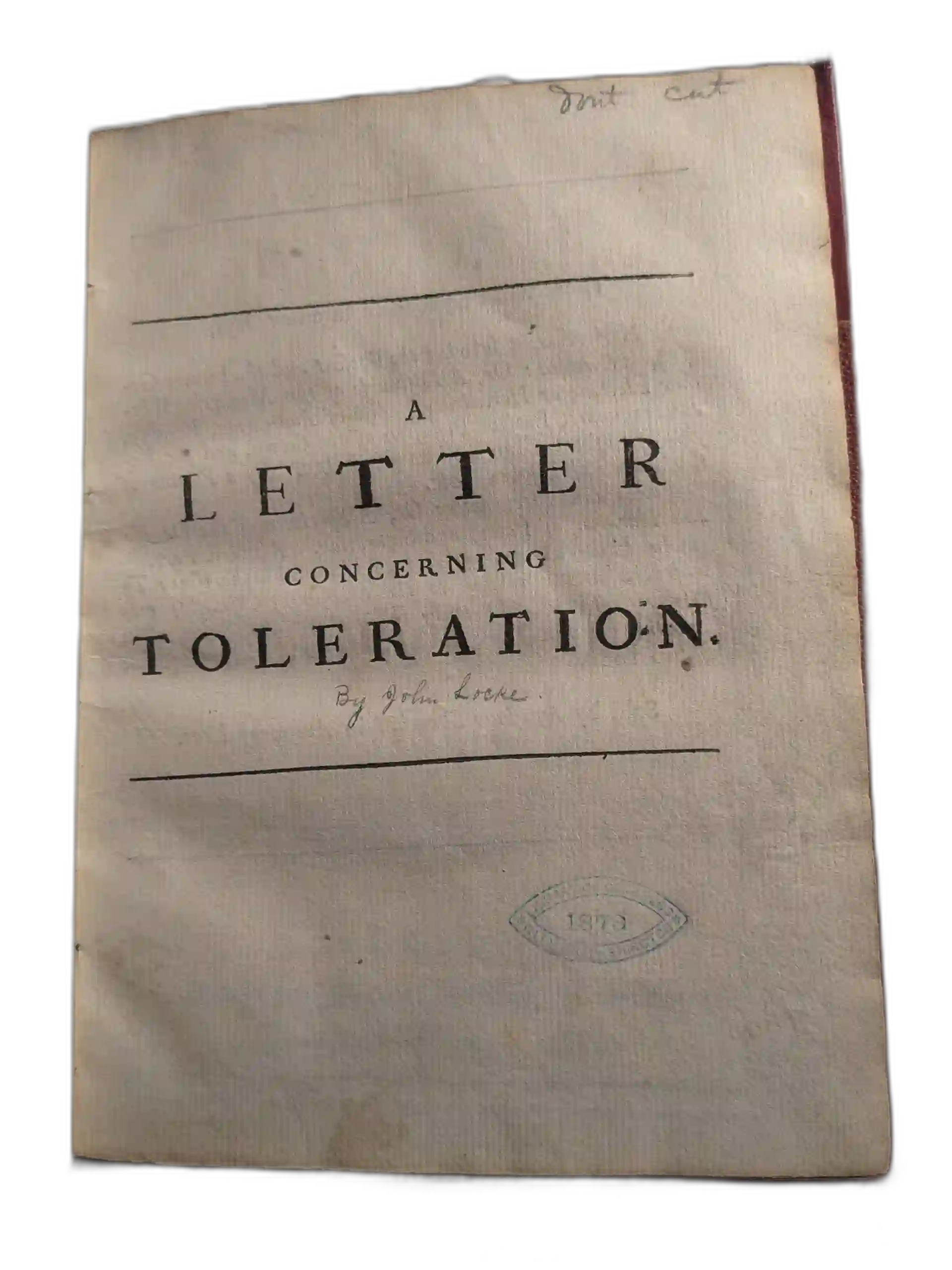
A
LETTER
CONCERNING
TOLERATION.
By John Locke
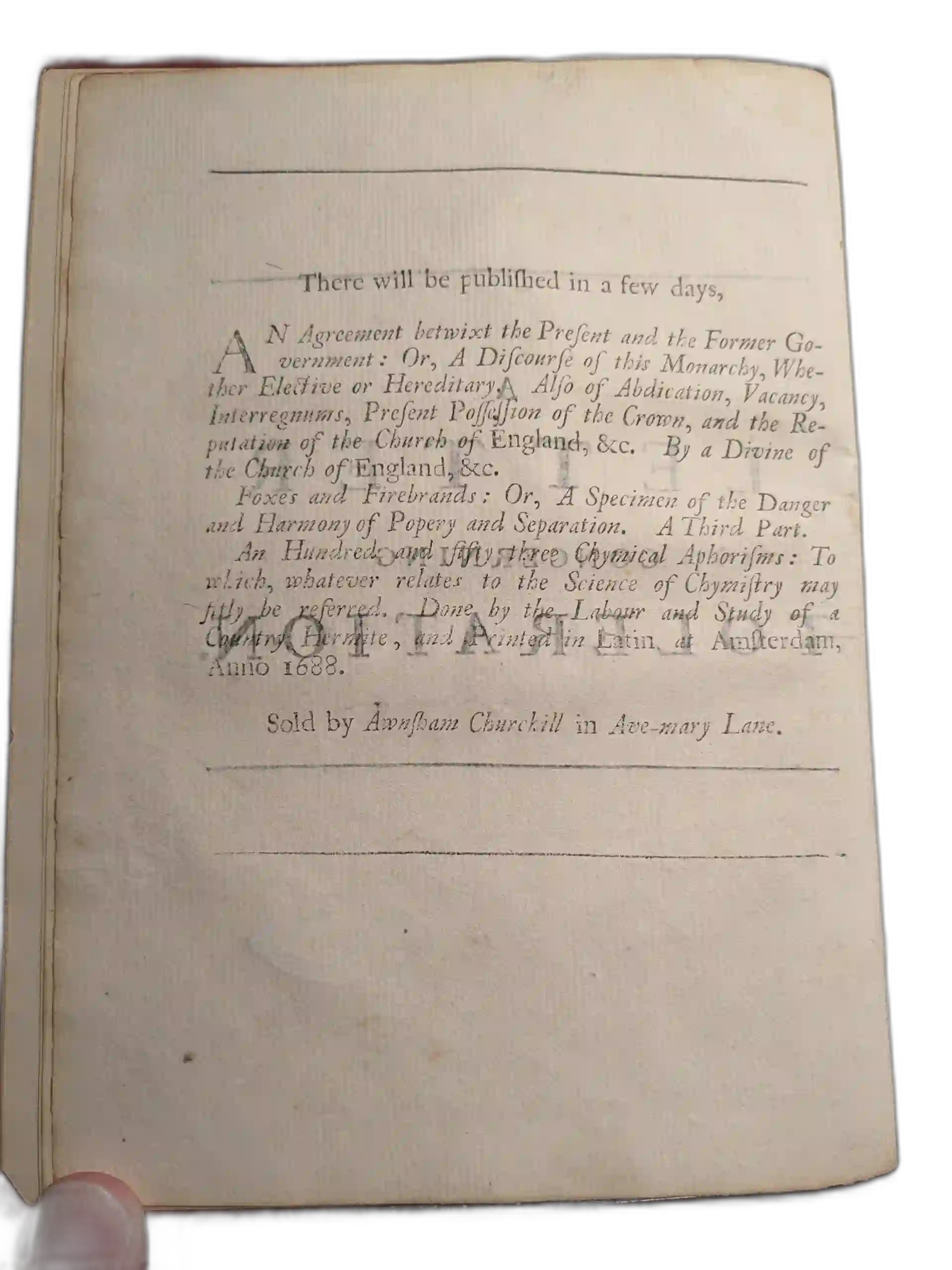
There will be published in a few days,
AN Agreement betwixt the Present and the Former Go-
vernment: Or, A Discourse of this Monarchy, Whe-
ther Elective or Hereditary, Also of Abdication, Vacancy,
Interregnums, Present Possession of the Crown, and the Re-
putation of the Church of England, &c. By a Divine of
the Church of England, &c.
Foxes and Firebrands: Or, A Specimen of the Danger
and Harmony of Popery and Separation. A Third Part.
An Hundred and fifty three Chymical Aphorisms: To
which, whatever relates to the Science of Chymistry may
fitly be referred. Done by the Labour and Study of a
Country Hermite, and Printed in Latin at Amsterdam,
Anno 1688.
Sold by Awnsham Churchill in Ave-mary Lane.
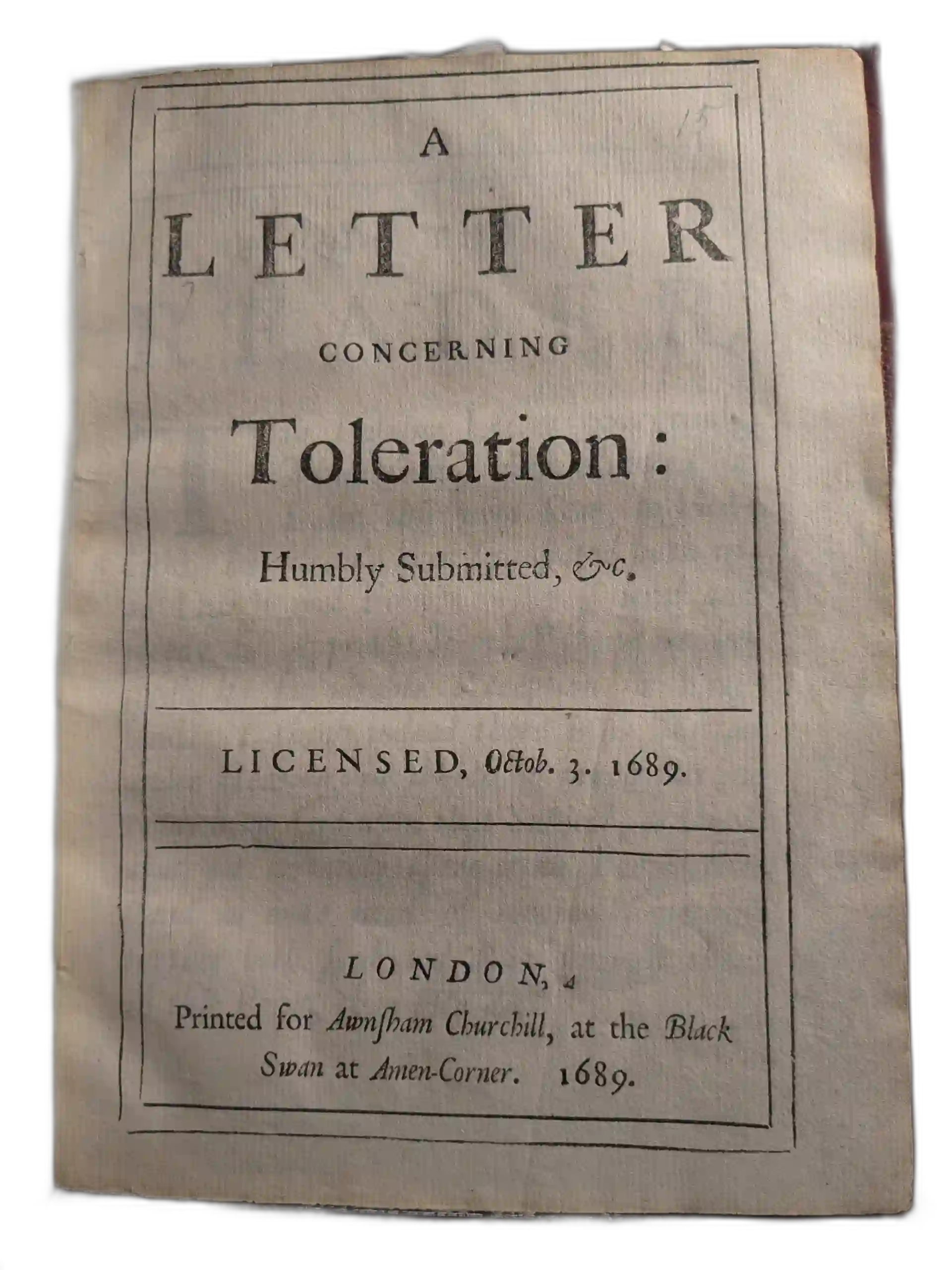
A
LETTER
CONCERNING
Toleration:
Humbly Submitted, &c.
LICENSED, Octob. 3. 1689.
LONDON,
Printed for Awnsham Churchill, at the Black
Swan at Amen-Corner. 1689.
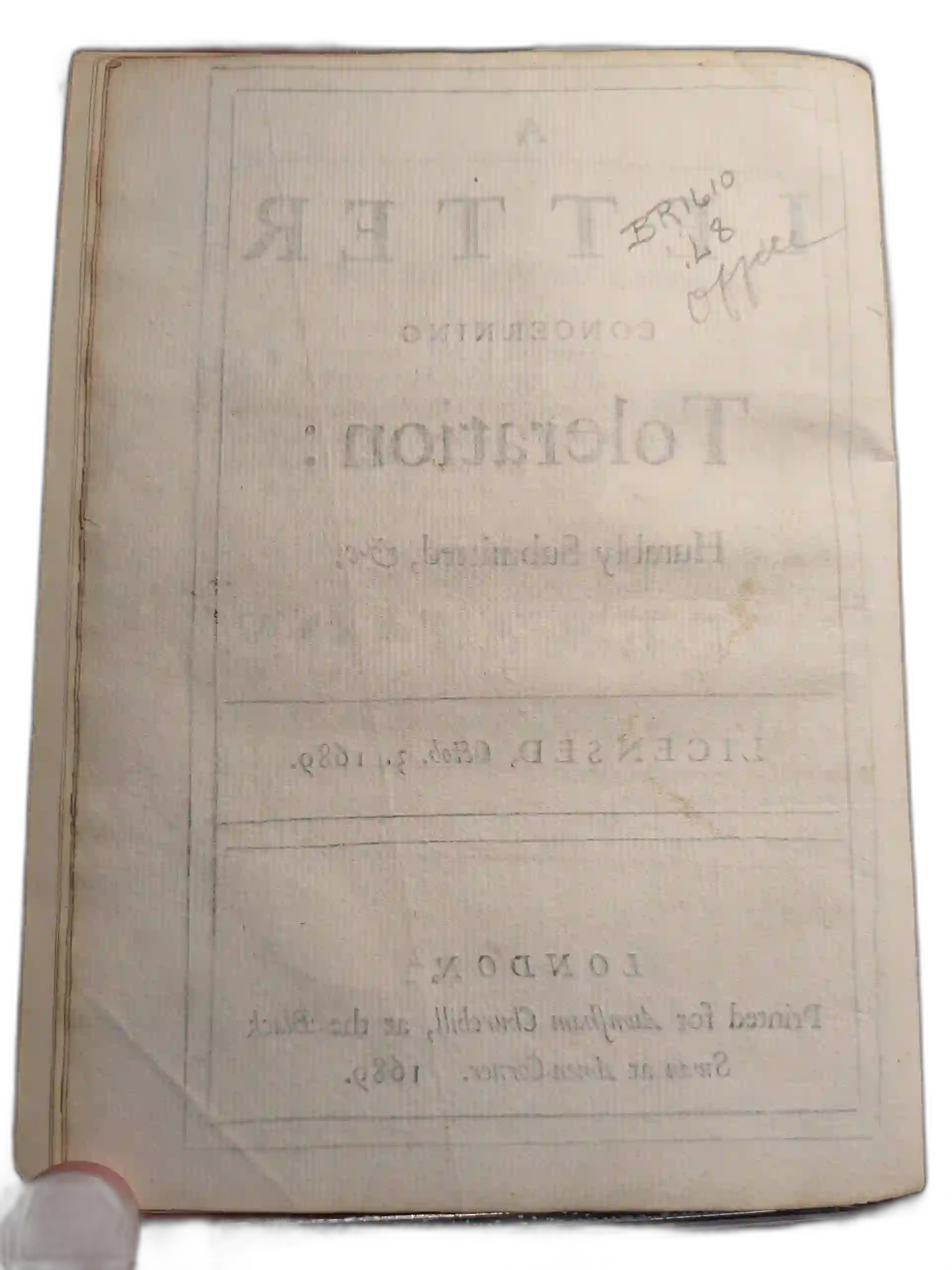
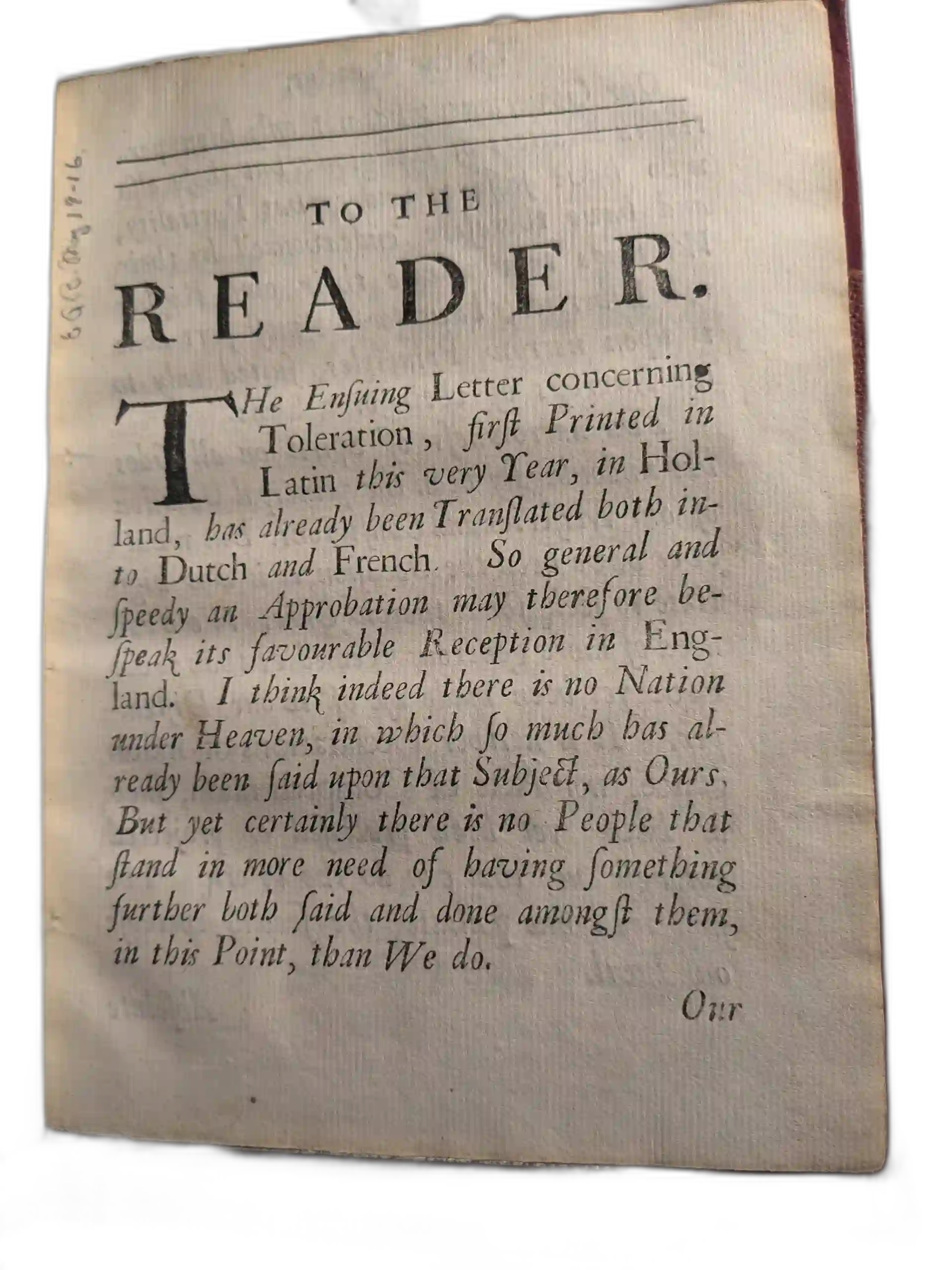
TO THE
READER.
THe Ensuing Letter concerning
Toleration, first Printed in
Latin this very Year, in Hol-
land, has already been Translated both in-
to Dutch and French. So general and
speedy an Approbation may therefore be-
speak its favourable Reception in Eng-
land. I think indeed there is no Nation
under Heaven, in which so much has al-
ready been said upon that Subject, as Ours.
But yet certainly there is no People that
stand in more need of having something
further both said and done amongst them,
in this Point, than We do.
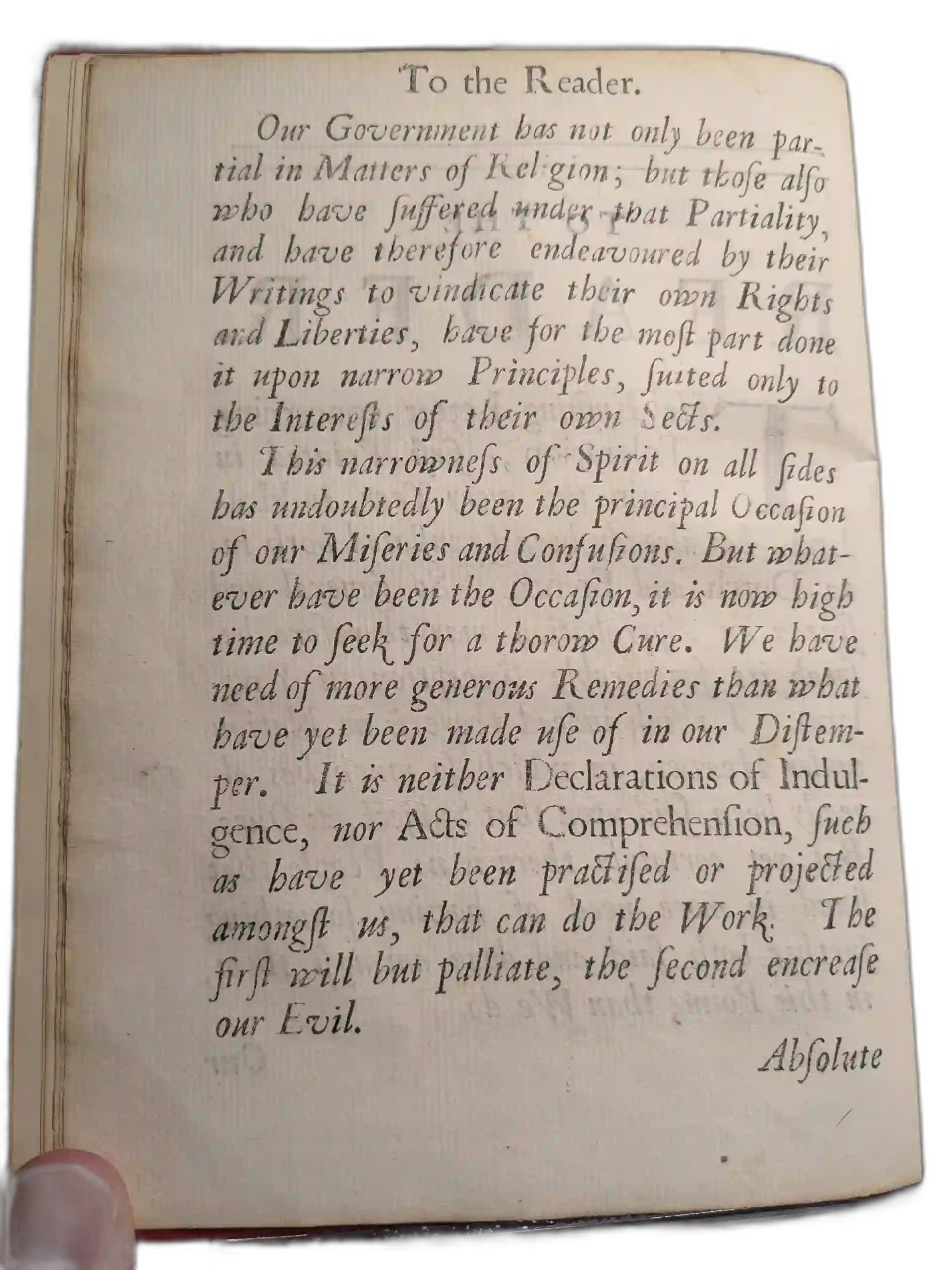
Our Government has not only been par-
tial in Matters of Religion; but those also
who have suffered under that Partiality,
and have therefore endeavoured by their
Writings to vindicate their own Rights
and Liberties, have for the most part done
it upon narrow Principles, suited only to
the Interests of their own Sects.
This narrowness of Spirit on all sides
has undoubtedly been the principal Occasion
of our Miseries and Confusions. But what-
ever have been the Occasion, it is now high
time to seek for a thorow Cure. We have
need of more generous Remedies than what
have yet been made use of in our Distem-
per. It is neither Declarations of Indul-
gence, nor Acts of Comprehension, such
as have yet been practised or projected
amongst us, that can do the Work. The
first will but palliate, the second encrease
our Evil.
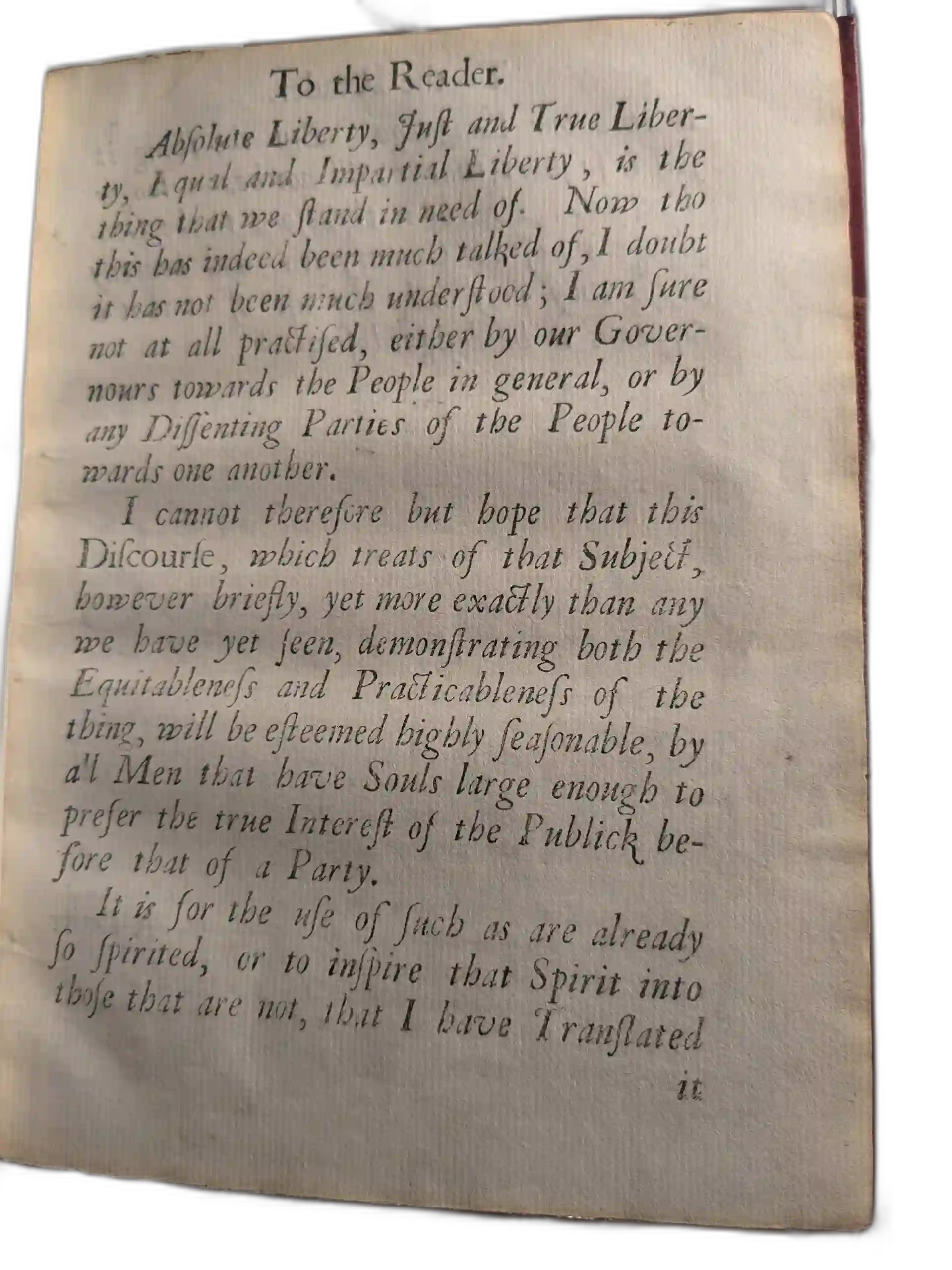
Absolute Liberty, Just and True Liber-
ty, Equal and Impartial Liberty, is the
thing that we stand in need of. Now tho
this has indeed been much talked of, I doubt
it has not been much understood; I am sure
not at all practised, either by our Gover-
nours towards the People in general, or by
any Dissenting Parties of the People to-
wards one another.
I cannot therefore but hope that this
Discourse, which treats of that Subject,
however briefly, yet more exactly than any
we have yet seen, demonstrating both the
Equitableness and Practicableness of the
thing, will be esteemed highly seasonable, by
all Men that have Souls large enough to
prefer the true Interest of the Publick be-
fore that of a Party.
It is for the use of such as are already
so spirited, or to inspire that Spirit into
those that are not, that I have Translated
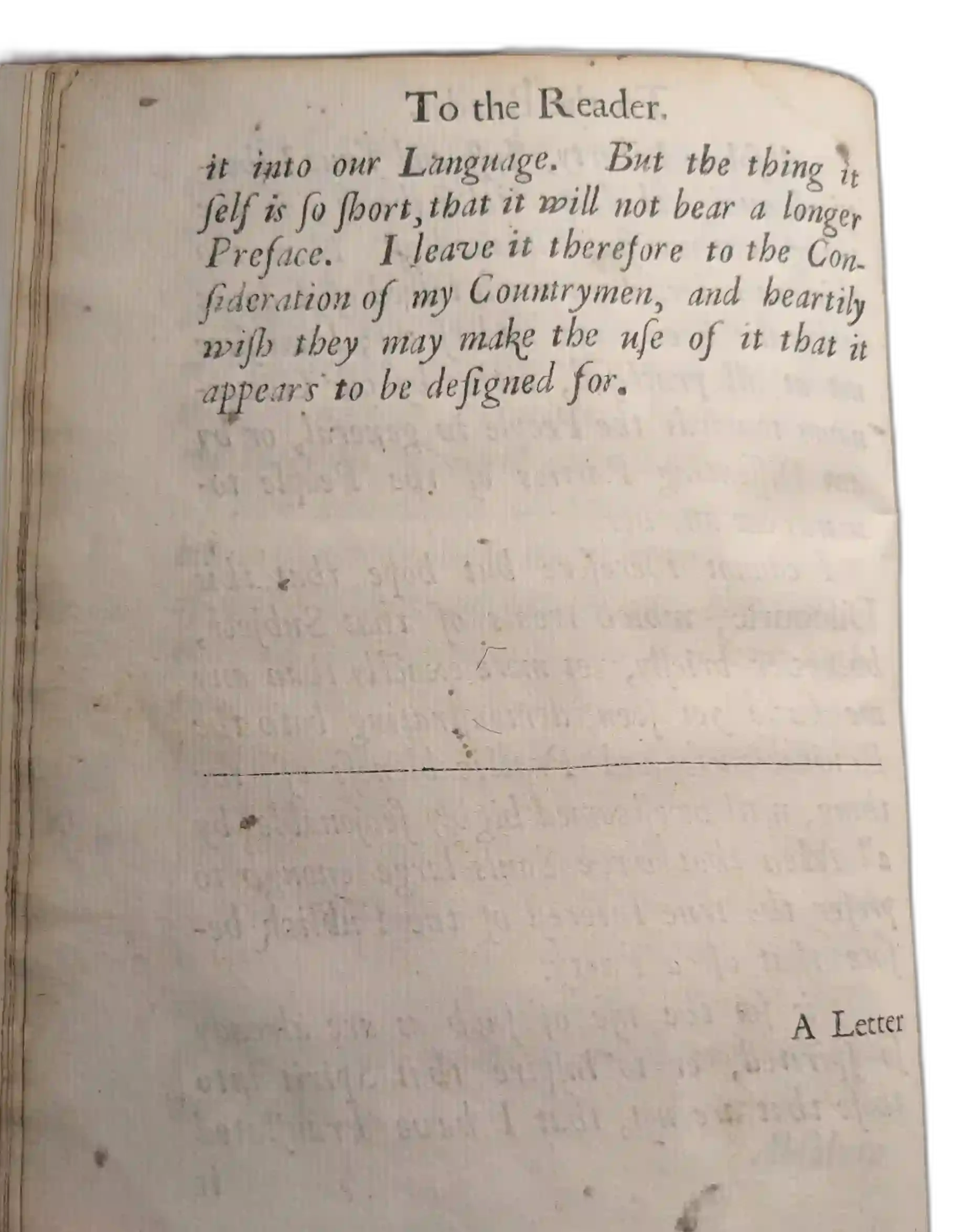
it into our Language. But the thing it
self is so short, that it will not bear a longer
Preface. I leave it therefore to the Con-
sideration of my Countrymen, and heartily
wish they may make the use of it that it
appears to be designed for.
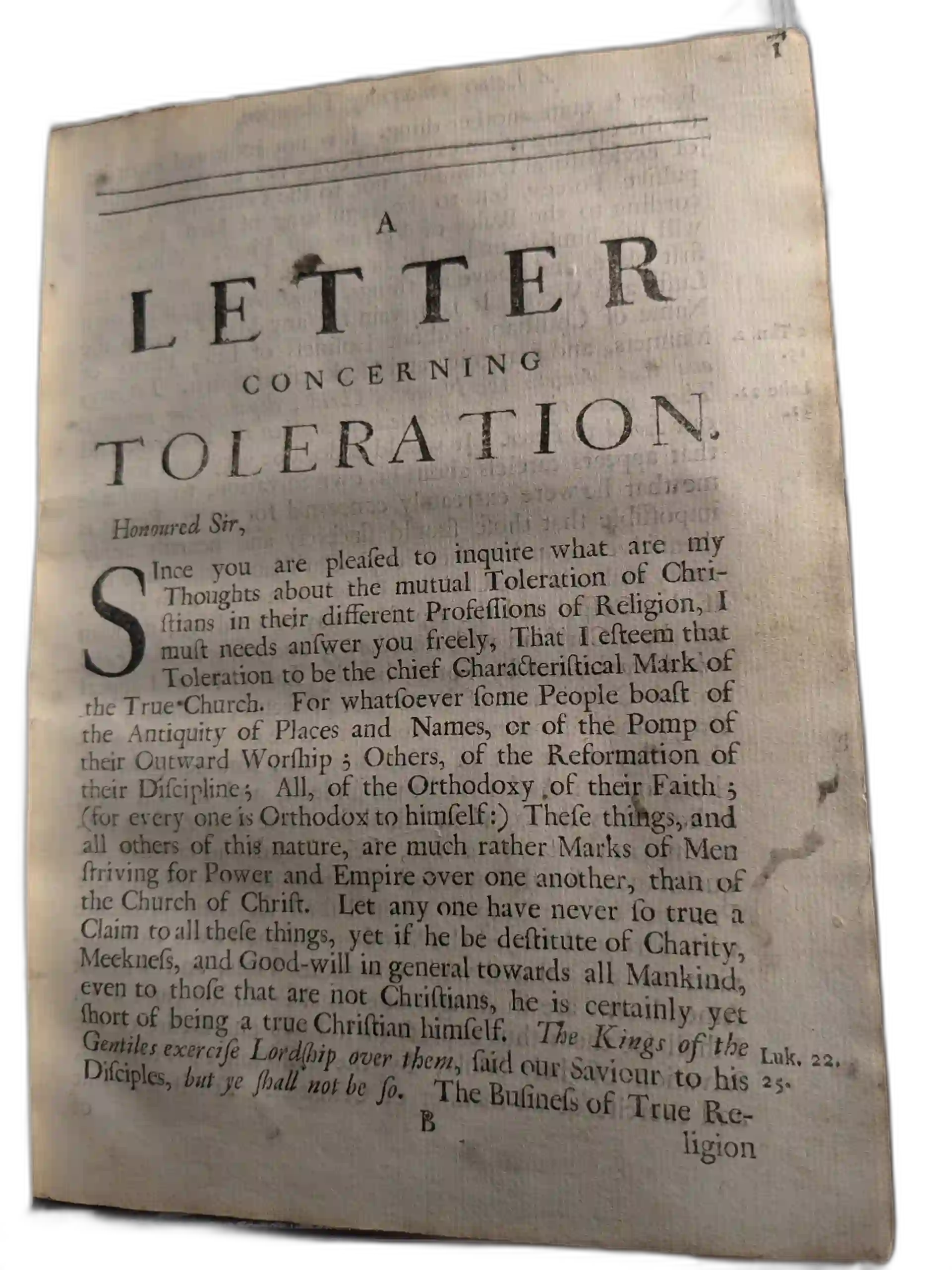
[1]
A
LETTER
CONCERNING
TOLERATION.
Honoured Sir,
SInce you are pleased to inquire what are my
Thoughts about the mutual Toleration of Chri-
stians in their different Professions of Religion, I
must needs answer you freely, That I esteem that
Toleration to be the chief Characteristical Mark of
the True Church. For whatsoever some People boast of
the Antiquity of Places and Names, or of the Pomp of
their Outward Worship; Others, of the Reformation of
their Discipline; All, of the Orthodoxy of their Faith;
(for every one is Orthodox to himself : ) These things, and
all others of this nature, are much rather Marks of Men
striving for Power and Empire over one another, than of
the Church of Christ. Let any one have never so true a
Claim to all these things, yet if he be destitute of Charity,
Meekness, and Good-will in general towards all Mankind,
even to those that are not Christians, he is certainly yet
short of being a true Christian himself.*Luk. 22. 25. The Kings of the
Gentiles exercise Lordship over them, said our Saviour to his
Disciples, but ye shall not be so. The Business of True Re-
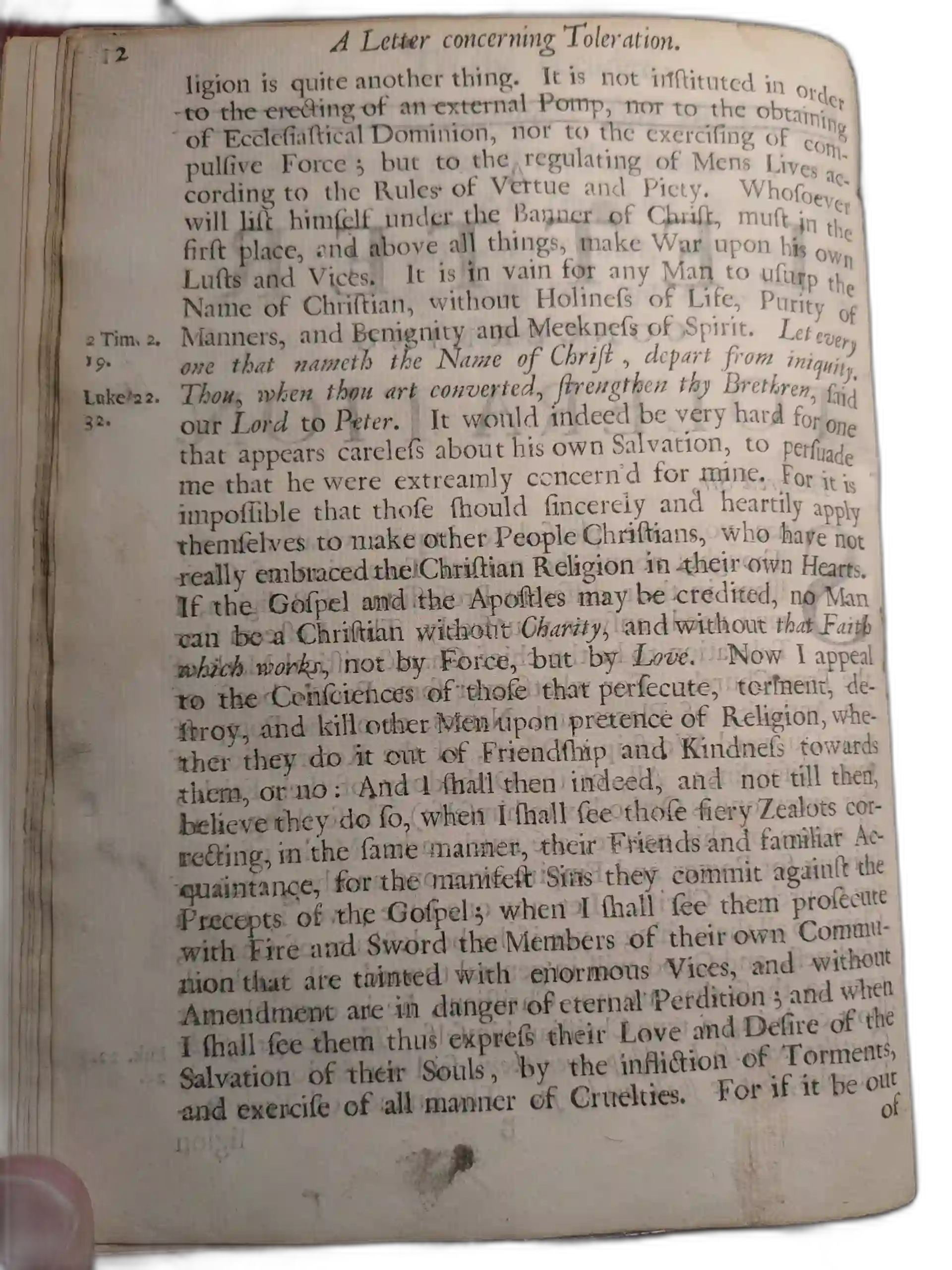
[2]
ligion is quite another thing. It is not instituted in order
to the erecting of an external Pomp, nor to the obtaining
of Ecclesiastical Dominion, nor to the exercising of com-
pulsive Force; but to the regulating of Mens Lives ac-
cording to the Rules of Vertue and Piety. Whosoever
will lift himself under the Banner of Christ, must in the
first place, and above all things, make War upon his own
Lusts and Vices. It is in vain for any Man to usurp the
Name of Christian, without Holiness of Life, Purity of
Manners,*2 Tim. 2. 19. and Benignity and Meekness of Spirit. Let every
one that nameth the Name of Christ, depart from iniquity.
Thou, *Luke 22. 32. when thou art converted, strengthen thy Brethren, said
our Lord to Peter. It would indeed be very hard for one
that appears careless about his own Salvation, to persuade
me that he were extreamly concern’d for mine. For it is
impossible that those should sincerely and heartily apply
themselves to make other People Christians, who have not
really embraced the Christian Religion in their own Hearts.
If the Gospel and the Apostles may be credited, no Man
can be a Christian without Charity, and without that Faith
which works, not by Force, but by Love. Now I appeal
to the Consciences of those that persecute, torment, de-
stroy, and kill other Men upon pretence of Religion, whe-
ther they do it out of Friendship and Kindness towards
them, or no: And I shall then indeed, and not till then,
believe they do so, when I shall see those fiery Zealots cor-
recting, in the same manner, their Friends and familiar Ac-
quaintance, for the manifest Sins they commit against the
Precepts of the Gospel; when I shall see them prosecute
with Fire and Sword the Members of their own Commu-
nion that are tainted with enormous Vices, and without
Amendment are in danger of eternal Perdition; and when
I shall see them thus express their Love and Desire of the
Salvation of their Souls, by the infliction of Torments,
and exercise of all manner of Cruelties. For if it be out
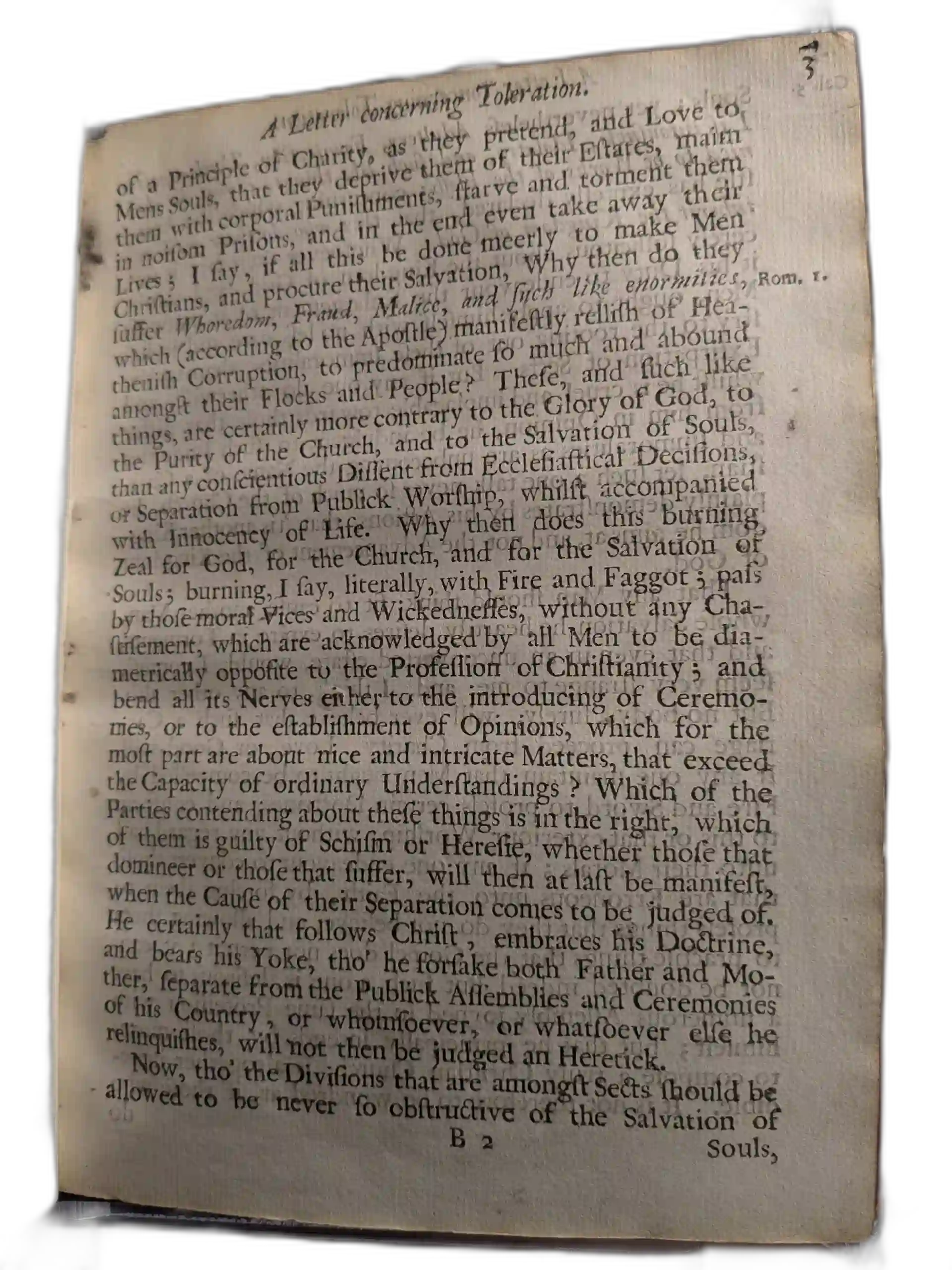
[3]
of a Principle of Charity, as they pretend, and Love to
Mens Souls, that they deprive them of their Estates, maim
them with corporal Punishments, starve and torment them
in noisom Prisons, and in the end even take away their
Lives; I say, if all this be done meerly to make Men
Christians, and procure their Salvation, Why then do they
suffer Whoredom, *Rom. 1. Fraud, Malice, and such like enormities,
which (according to the Apostle) manifestly rellish of Hea-
thenish Corruption, to predominate so much and abound
amongst their Flocks and People? These, and such like
things, are certainly more contrary to the Glory of God, to
the Purity of the Church, and to the Salvation of Souls,
than any conscientious Dissent from Ecclesiastical Decisions,
or Separation from Publick Worship, whilst accompanied
with Innocency of Life. Why then does this burning
Zeal for God, for the Church, and for the Salvation of
Souls; burning, I say, literally, with Fire and Faggot; pass
by those moral Vices and Wickednesses, without any Cha-
stisement, which are acknowledged by all Men to be dia-
metrically opposite to the Profession of Christianity; and
bend all its Nerves either to the introducing of Ceremo-
nies, or to the establishment of Opinions, which for the
most part are about nice and intricate Matters, that exceed
the Capacity of ordinary Understandings? Which of the
Parties contending about these things is in the right, which
of them is guilty of Schism or Heresie, whether those that
domineer or those that suffer, will then at last be manifest,
when the Cause of their Separation comes to be judged of.
He certainly that follows Christ, embraces his Doctrine,
and bears his Yoke, tho’ he forsake both Father and Mo-
ther, separate from the Publick Assemblies and Ceremonies
of his Country, or whomsoever, or whatsoever else he
relinquishes, will not then be judged an Heretick.
Now, tho’ the Divisions that are amongst Sects should be
allowed to be never so obstructive of the Salvation of
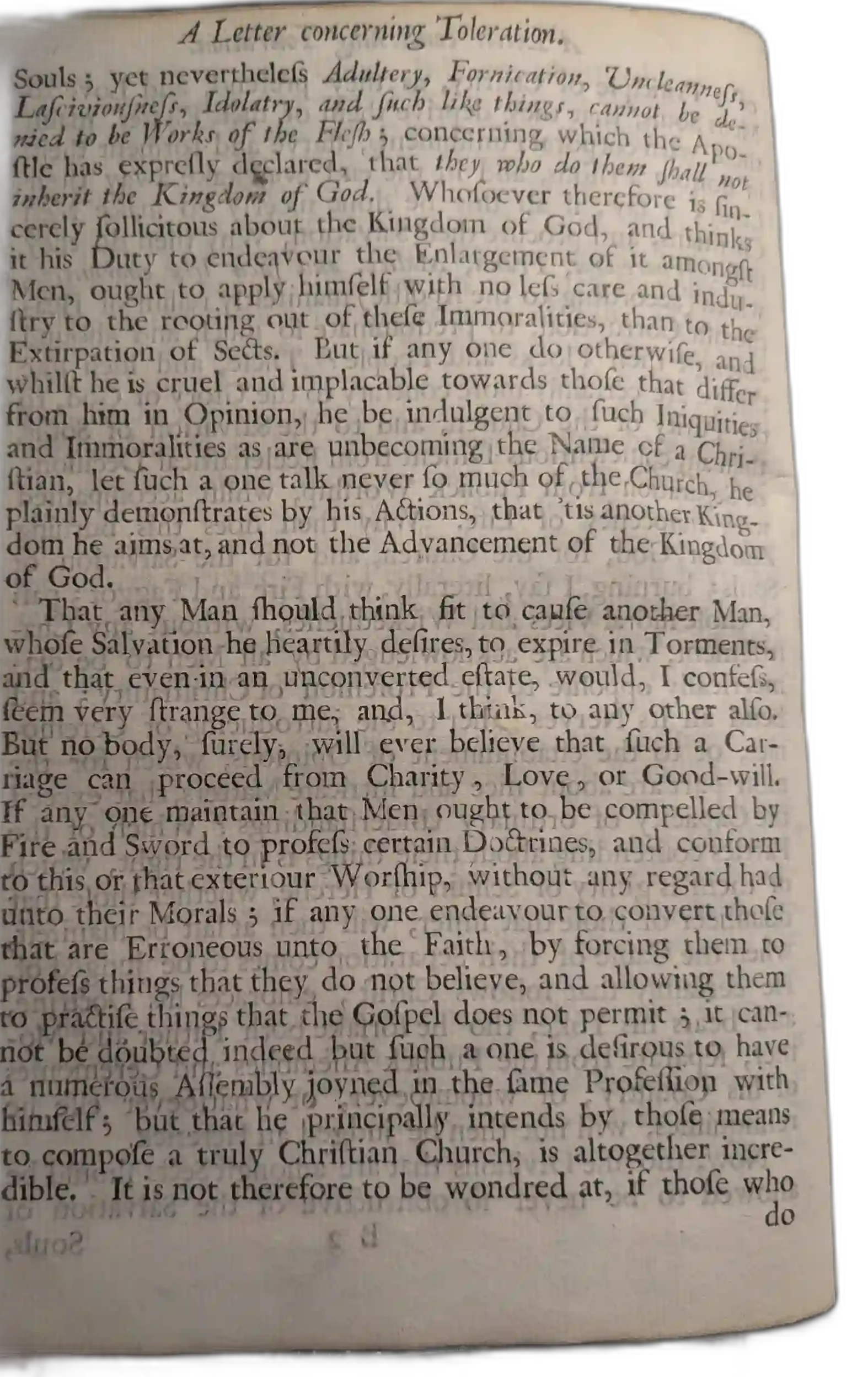
[4]
Souls;*Gal.5. yet nevertheless Adultery, Fornication, Uncleanness,
Lasciviousness, Idolatry, and such like things, cannot be de-
nied to be Works of the Flesh; concerning which the Apo-
stle has expresly declared, that they who do them shall not
inherit the Kingdom of God. Whosoever therefore is sin-
cerely sollicitous about the Kingdom of God, and thinks
it his Duty to endeavour the Enlargement of it amongst
Men, ought to apply himself with no less care and indu-
stry to the rooting out of these Immoralities, than to the
Extirpation of Sects. But if any one do otherwise, and
whilst he is cruel and implacable towards those that differ
from him in Opinion, he be indulgent to such Iniquities
and Immoralities as are unbecoming the Name of a Chri-
stian, let such a one talk never so much of the Church, he
plainly demonstrates by his Actions, that ’tis another King-
dom he aims at, and not the Advancement of the Kingdom
of God.
That any Man should think fit to cause another Man,
whose Salvation he heartily desires, to expire in Torments,
and that even in an unconverted estate, would, I confess,
seem very strange to me, and, I think, to any other also.
But no body, surely, will ever believe that such a Car-
riage can proceed from Charity, Love, or Good-will.
If any one maintain that Men ought to be compelled by
Fire and Sword to profess certain Doctrines, and conform
to this or that exteriour Worship, without any regard had
unto their Morals; if any one endeavour to convert those
that are Erroneous unto the Faith, by forcing them to
profess things that they do not believe, and allowing them
to practise things that the Gospel does not permit; it can-
not be doubted indeed but such a one is desirous to have
a numerous Assembly joyned in the same Profession with
himself; but that he principally intends by those means
to compose a truly Christian Church, is altogether incre-
dible. It is not therefore to be wondred at, if those who
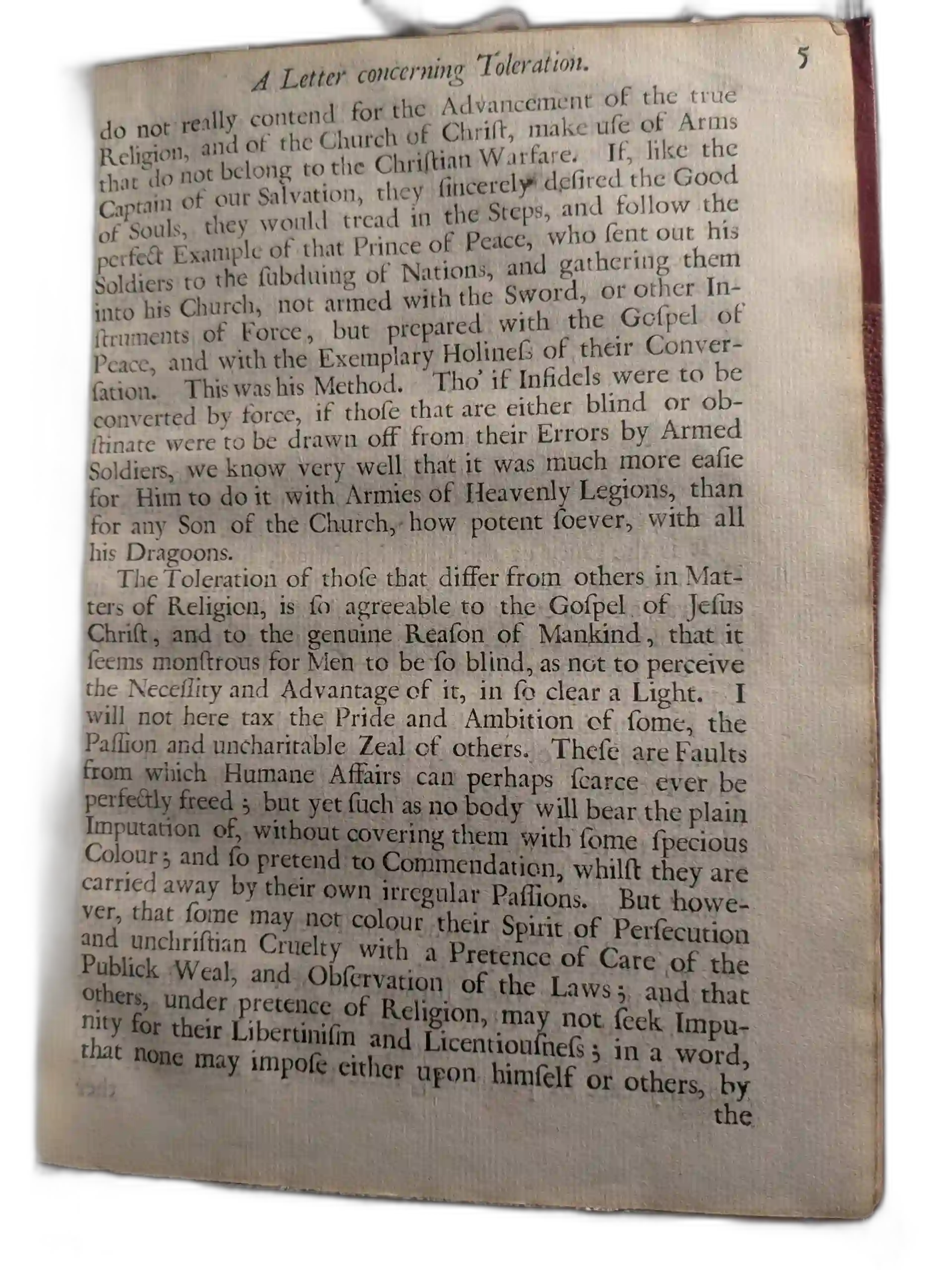
[5]
do not really contend for the Advancement of the true
Religion, and of the Church of Christ, make use of Arms
that do not belong to the Christian Warfare. If, like the
Captain of our Salvation, they sincerely desired the Good
of Souls, they would tread in the Steps, and follow the
perfect Example of that Prince of Peace, who sent out his
Soldiers to the subduing of Nations, and gathering them
into his Church, not armed with the Sword, or other In-
struments of Force, but prepared with the Gospel of
Peace, and with the Exemplary Holiness of their Conver-
sation. This was his Method. Tho’ if Infidels were to be
converted by force, if those that are either blind or ob-
stinate were to be drawn off from their Errors by Armed
Soldiers, we know very well that it was much more easie
for Him to do it with Armies of Heavenly Legions, than
for any Son of the Church, how potent soever, with all
his Dragoons.
The Toleration of those that differ from others in Mat-
ters of Religion, is so agreeable to the Gospel of Jesus
Christ, and to the genuine Reason of Mankind, that it
seems monstrous for Men to be so blind, as not to perceive
the Necessity and Advantage of it, in so clear a Light. I
will not here tax the Pride and Ambition of some, the
Passion and uncharitable Zeal of others. These are Faults
from which Humane Affairs can perhaps scarce ever be
perfectly freed; but yet such as no body will bear the plain
Imputation of, without covering them with some specious
Colour; and so pretend to Commendation, whilst they are
carried away by their own irregular Passions. But howe-
ver, that some may not colour their Spirit of Persecution
and unchristian Cruelty with a Pretence of Care of the
Publick Weal, and Observation of the Laws; and that
others, under pretence of Religion, may not seek Impu-
nity for their Libertinism and Licentiousness; in a word,
that none may impose either upon himself or others, by
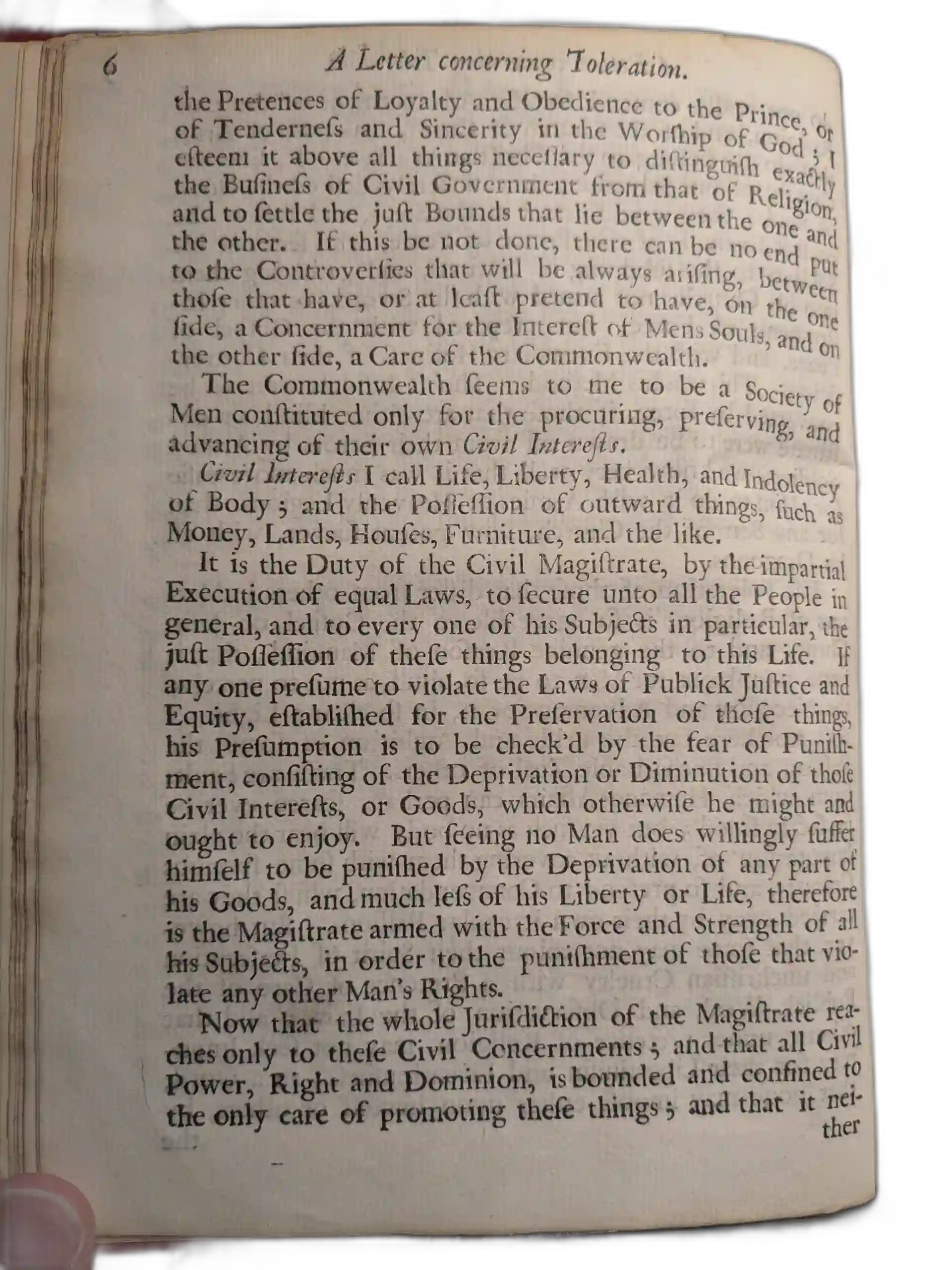
[6]
the Pretences of Loyalty and Obedience to the Prince, or
of Tenderness and Sincerity in the Worship of God; I
esteem it above all things necessary to distinguish exactly
the Business of Civil Government from that of Religion,
and to settle the just Bounds that lie between the one and
the other. If this be not done, there can be no end put
to the Controversies that will be always arising, between
those that have, or at least pretend to have, on the one
side, a Concernment for the Interest of Mens Souls, and on
the other side, a Care of the Commonwealth.
The Commonwealth seems to me to be a Society of
Men constituted only for the procuring, preserving, and
advancing of their own Civil Interests.
Civil Interests I call Life, Liberty, Health, and Indolency
of Body; and the Possession of outward things, such as
Money, Lands, Houses, Furniture, and the like.
It is the Duty of the Civil Magistrate, by the impartial
Execution of equal Laws, to secure unto all the People in
general, and to every one of his Subjects in particular, the
just Possession of these things belonging to this Life. If
any one presume to violate the Laws of Publick Justice and
Equity, established for the Preservation of those things,
his Presumption is to be check’d by the fear of Punish-
ment, consisting of the Deprivation or Diminution of those
Civil Interests, or Goods, which otherwise he might and
ought to enjoy. But seeing no Man does willingly suffer
himself to be punished by the Deprivation of any part of
his Goods, and much less of his Liberty or Life, therefore
is the Magistrate armed with the Force and Strength of all
his Subjects, in order to the punishment of those that vio-
late any other Man’s Rights.
Now that the whole Jurisdiction of the Magistrate rea-
ches only to these Civil Concernments; and that all Civil
Power, Right and Dominion, is bounded and confined to
the only care of promoting these things; and that it nei-
[7]
ther can nor ought in any manner to be extended to the
Salvation of Souls, these following Considerations seem un-
to me abundantly to demonstrate.
First, Because the Care of Souls is not committed to
the Civil Magistrate, any more than to other Men. It is not
committed unto him, I say, by God; because it appears not
that God has ever given any such Authority to one Man
over another, as to compell any one to his Religion. Nor
can any such Power be vested in the Magistrate by the
consent of the People; because no man can so far abandon
the care of his own Salvation, as blindly to leave it to the
choice of any other, whether Prince or Subject, to pre-
scribe to him what Faith or Worship he shall embrace. For
no Man can, if he would, conform his Faith to the Dictates
of another. All the Life and Power of true Religion con-
sists in the inward and full perswasion of the mind; and
Faith is not Faith without believing. Whatever Profes-
sion we make, to whatever outward Worship we conform,
if we are not fully satisfied in our own mind that the one
is true, and the other well pleasing unto God, such Pro-
fession and such Practice, far from being any furtherance,
are indeed great Obstacles to our Salvation. For in this
manner, instead of expiating other Sins by the exercise of
Religion, I say in offering thus unto God Almighty such
a Worship as we esteem to be displeasing unto him, we
add unto the number of our other sins, those also of
Hypocrisie, and Contempt of his Divine Majesty.
In the second place. The care of Souls cannot belong
to the Civil Magistrate, because his Power consists only
in outward force; but true and saving Religion consists
in the inward perswasion of the Mind, without which
nothing can be acceptable to God. And such is the na-
ture of the Understanding, that it cannot be compell’d
to the belief of any thing by outward force. Confisca-
tion of Estate, Imprisonment, Torments, nothing of that
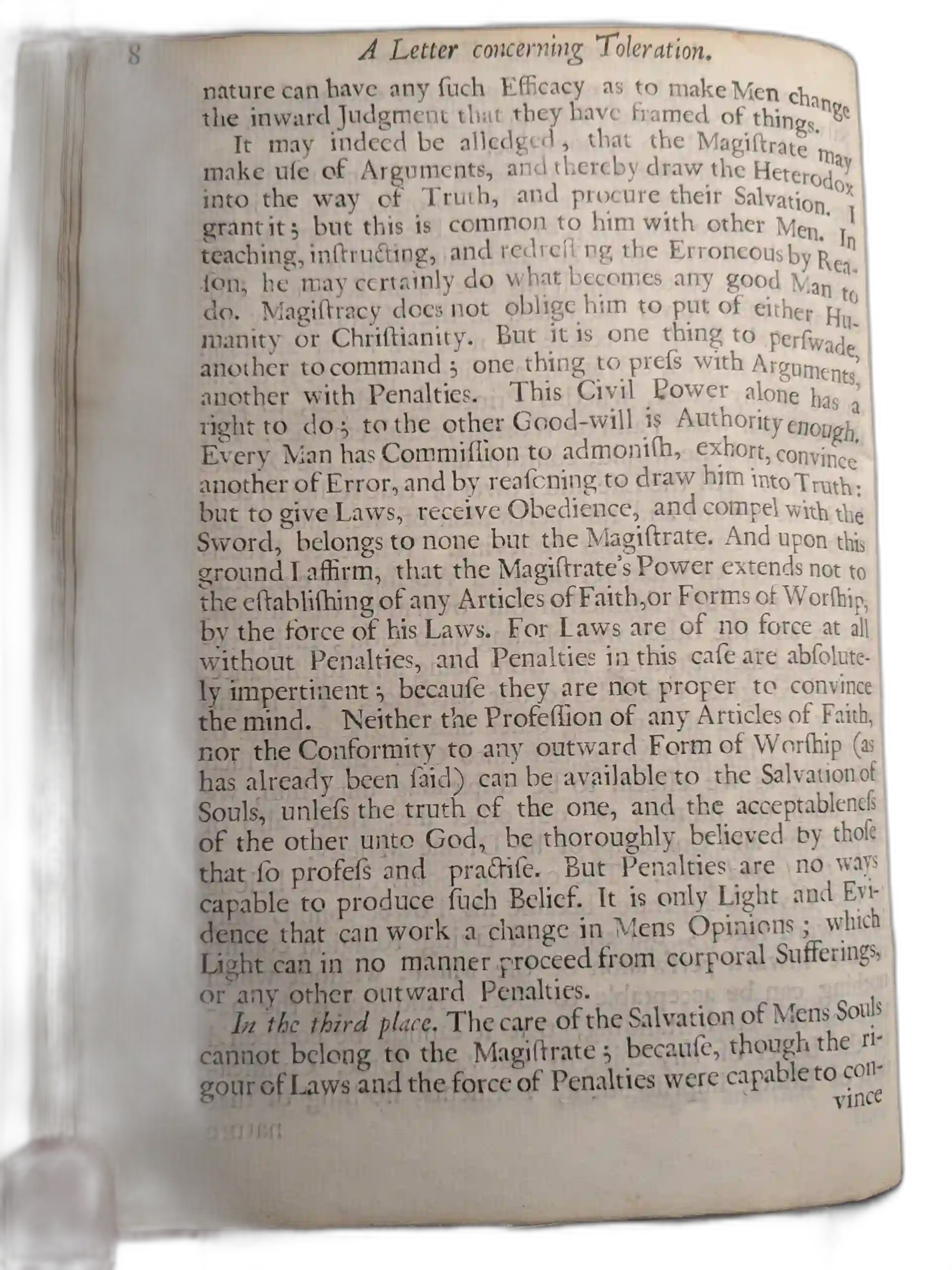
[8]
nature can have any such Efficacy as to make Men change
the inward Judgment that they have framed of things.
It may indeed be alledged, that the Magistrate may
make use of Arguments, and thereby draw the Heterodox
into the way of Truth, and procure their Salvation. I
grant it; but this is common to him with other Men. In
teaching, instructing, and redressing the Erroneous by Rea-
son, he may certainly do what becomes any good Man to
do. Magistracy does not oblige him to put of either Hu-
manity or Christianity. But it is one thing to perswade,
another to command; one thing to press with Arguments,
another with Penalties. This Civil Power alone has a
right to do; to the other Good-will is Authority enough.
Every Man has Commission to admonish, exhort, convince
another of Error, and by reasoning to draw him into Truth:
but to give Laws, receive Obedience, and compel with the
Sword, belongs to none but the Magistrate. And upon this
ground I affirm, that the Magistrate’s Power extends not to
the establishing of any Articles of Faith, or Forms of Worship,
by the force of his Laws. For Laws are of no force at all
without Penalties, and Penalties in this case are absolute-
ly impertinent; because they are not proper to convince
the mind. Neither the Profession of any Articles of Faith,
nor the Conformity to any outward Form of Worship (as
has already been said) can be available to the Salvation of
Souls, unless the truth of the one, and the acceptableness
of the other unto God, be thoroughly believed by those
that so profess and practise. But Penalties are no ways
capable to produce such Belief. It is only Light and Evi-
dence that can work a change in Mens Opinions; which
Light can in no manner proceed from corporal Sufferings,
or any other outward Penalties.
In the third place. The care of the Salvation of Mens Souls
cannot belong to the Magistrate; because, though the ri-
gour of Laws and the force of Penalties were capable to con-
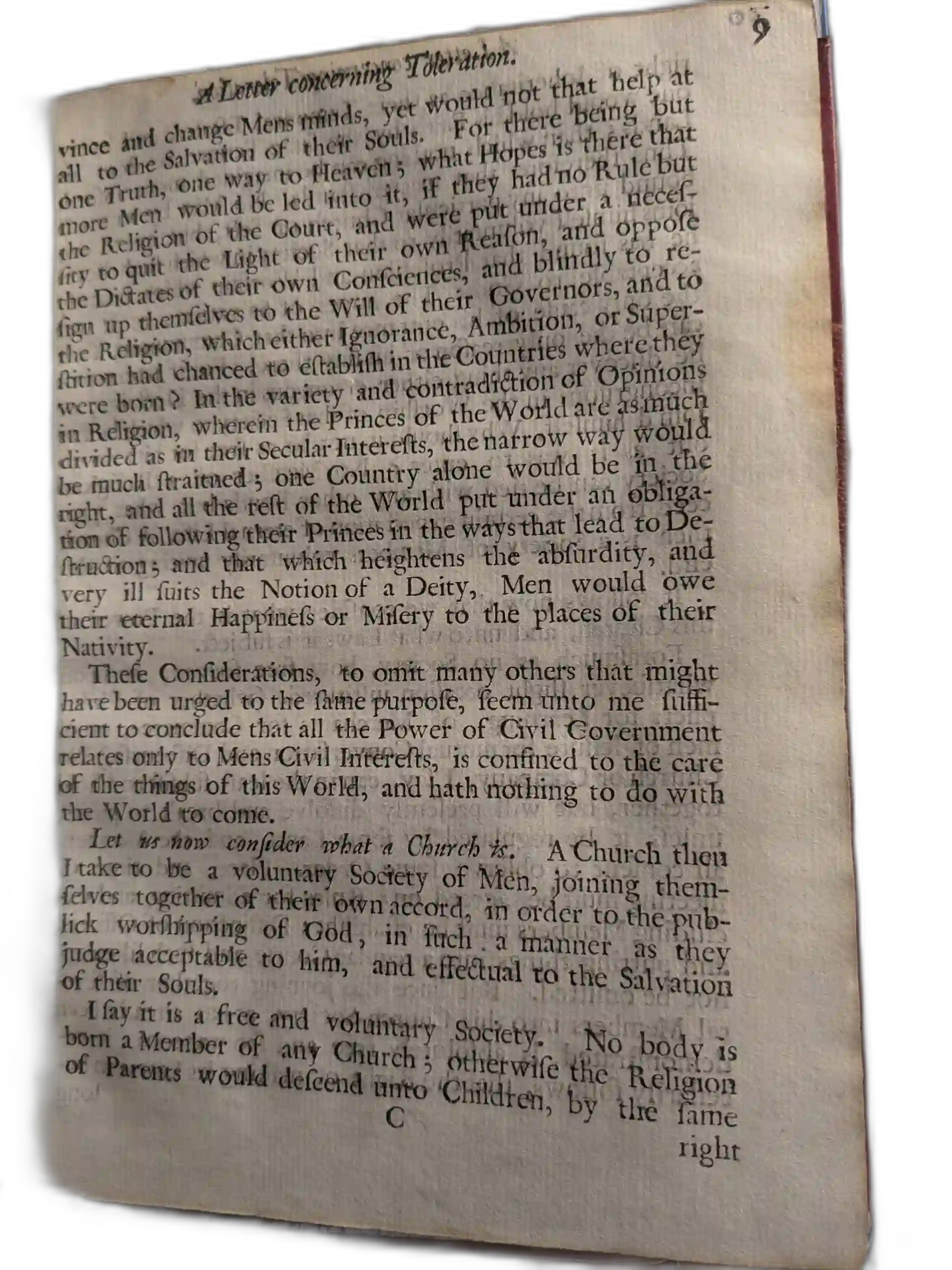
[9]
vince and change Mens minds, yet would not that help at
all to the Salvation of their Souls. For there being but
one Truth, one way to Heaven; what Hopes is there that
more Men would be led into it, if they had no Rule but
the Religion of the Court, and were put under a neces-
sity to quit the Light of their own Reason, and oppose
the Dictates of their own Consciences, and blindly to re-
sign up themselves to the Will of their Governors, and to
the Religion, which either Ignorance, Ambition, or Super-
stition had chanced to establish in the Countries where they
were born? In the variety and contradiction of Opinions
in Religion, wherein the Princes of the World are as much
divided as in their Secular Interests, the narrow way would
be much straitned; one Country alone would be in the
right, and all the rest of the World put under an obliga-
tion of following their Princes in the ways that lead to De-
struction; and that which heightens the absurdity, and
very ill suits the Notion of a Deity, Men would owe
their eternal Happiness or Misery to the places of their
Nativity.
These Considerations, to omit many others that might
have been urged to the same purpose, seem unto me suffi-
cient to conclude that all the Power of Civil Government
relates only to Mens Civil Interests, is confined to the care
of the things of this World, and hath nothing to do with
the World to come.
Let us now consider what a Church is. A Church then
I take to be a voluntary Society of Men, joining them-
selves together of their own accord, in order to the pub-
lick worshipping of God, in such a manner as they
judge acceptable to him, and effectual to the Salvation
of their Souls.
I say it is a free and voluntary Society. No body is
born a Member of any Church; otherwise the Religion
of Parents would descend unto Children, by the same
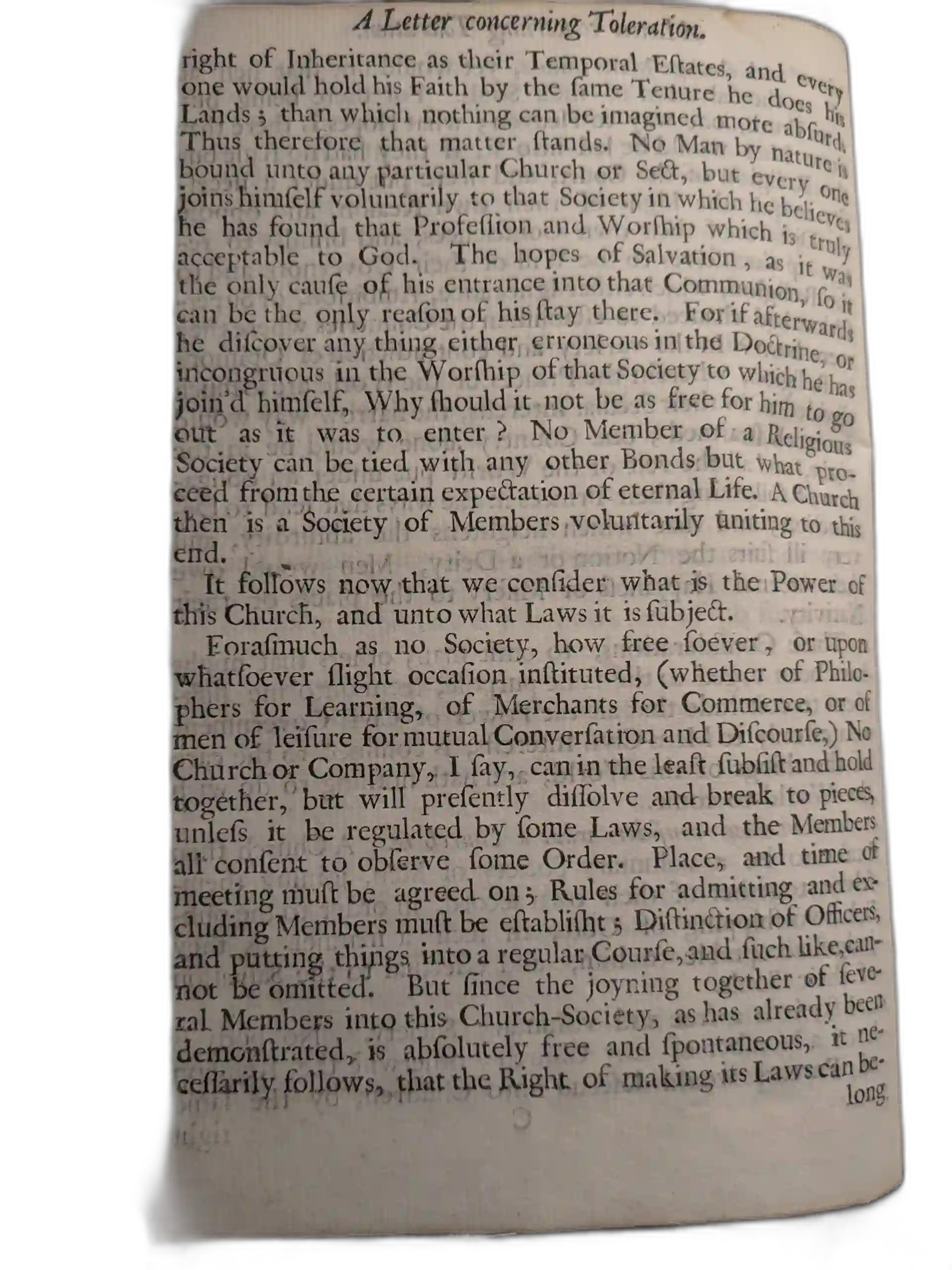
[10]
right of Inheritance as their Temporal Estates, and every
one would hold his Faith by the same Tenure he does his
Lands; than which nothing can be imagined more absurd.
Thus therefore that matter stands. No Man by nature is
bound unto any particular Church or Sect, but every one
joins himself voluntarily to that Society in which he believes
he has found that Profession and Worship which is truly
acceptable to God. The hopes of Salvation, as it was
the only cause of his entrance into that Communion, so it
can be the only reason of his stay there. For if afterwards
he discover any thing either erroneous in the Doctrine, or
incongruous in the Worship of that Society to which he has
join’d himself, Why should it not be as free for him to go
out as it was to enter? No Member of a Religious
Society can be tied with any other Bonds but what pro-
ceed from the certain expectation of eternal Life. A Church
then is a Society of Members voluntarily uniting to this
end.
It follows now that we consider what is the Power of
this Church, and unto what Laws it is subject.
Forasmuch as no Society, how free soever, or upon
whatsoever slight occasion instituted, (whether of Philo-
phers for Learning, of Merchants for Commerce, or of
men of leisure for mutual Conversation and Discourse, ) No
Church or Company, I say, can in the least subsist and hold
together, but will presently dissolve and break to pieces,
unless it be regulated by some Laws, and the Members
all consent to observe some Order. Place, and time of
meeting must be agreed on; Rules for admitting and ex-
cluding Members must be establisht; Distinction of Officers,
and putting things into a regular Course, and such like, can-
not be omitted. But since the joyning together of seve-
ral Members into this Church-Society, as has already been
demonstrated, is absolutely free and spontaneous, it ne-
cessarily follows, that the Right of making its Laws can be-
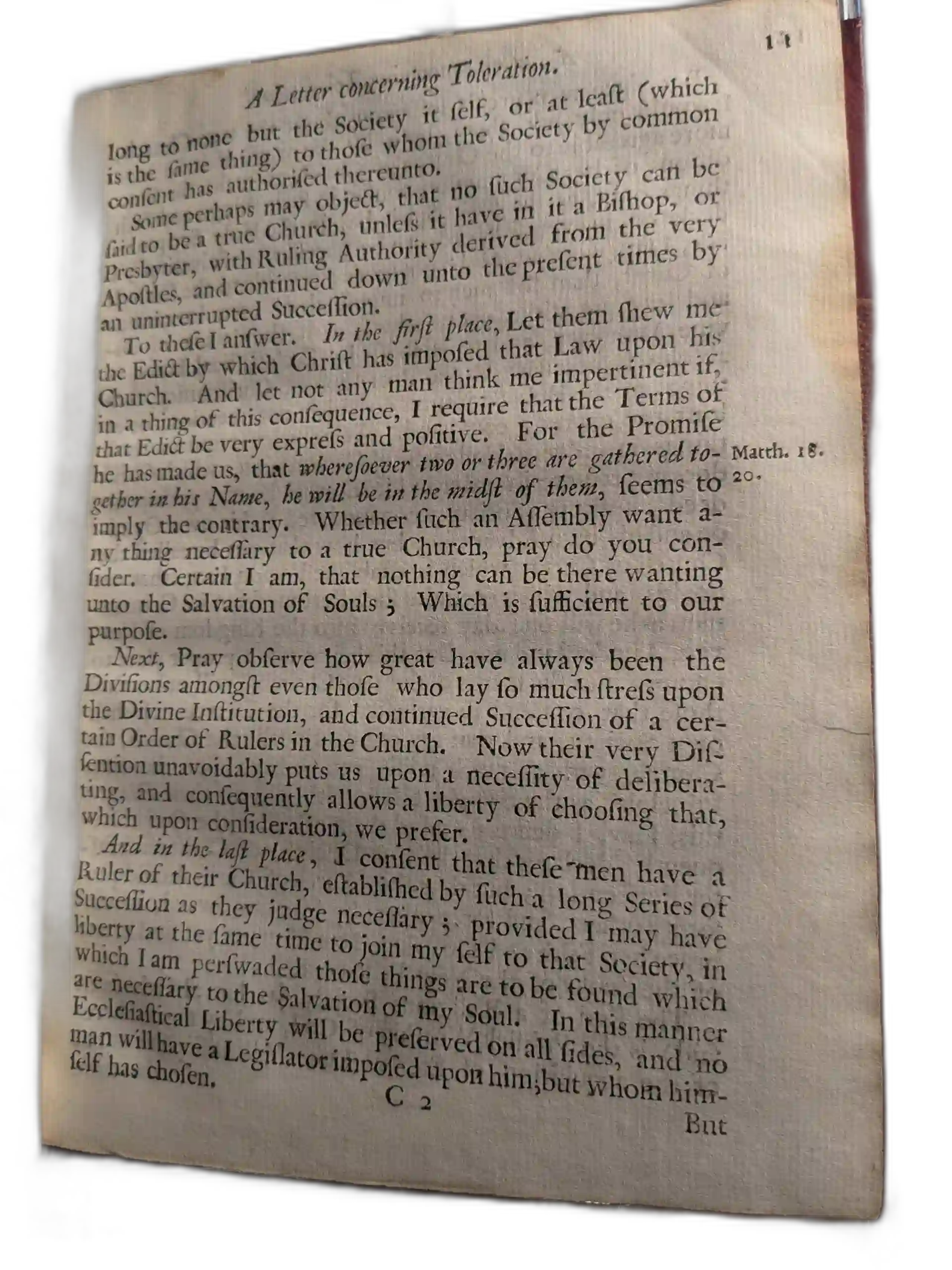
long to none but the Society it self, or at least (which
is the same thing) to those whom the Society by common
consent has authorised thereunto.
Some perhaps may object, that no such Society can be
said to be a true Church, unless it have in it a Bishop, or
Presbyter, with Ruling Authority derived from the very
Apostles, and continued down unto the present times by
an uninterrupted Succession.
To these I answer. In the first place, Let them shew me
the Edict by which Christ has imposed that Law upon his
Church. And let not any man think me impertinent if,
in a thing of this consequence, I require that the Terms of
that Edict be very express and positive. For the Promise
he has made us,*Matth. 18. 20. that wheresoever two or three are gathered to-
gether in his Name, he will be in the midst of them, seems to
imply the contrary. Whether such an Assembly want a-
ny thing necessary to a true Church, pray do you con-
sider. Certain I am, that nothing can be there wanting
unto the Salvation of Souls; Which is sufficient to our
purpose.
Next, Pray observe how great have always been the
Divisions amongst even those who lay so much stress upon
the Divine Institution, and continued Succession of a cer-
tain Order of Rulers in the Church. Now their very Dis-
sention unavoidably puts us upon a necessity of delibera-
ting, and consequently allows a liberty of choosing that,
which upon consideration, we prefer.
And in the last place, I consent that these men have a
Ruler of their Church, established by such a long Series of
Succession as they judge necessary; provided I may have
liberty at the same time to join my self to that Society, in
which I am perswaded those things are to be found which
are necessary to the Salvation of my Soul. In this manner
Ecclesiastical Liberty will be preserved on all sides, and no
man will have a Legislator imposed upon him, but whom him-
self has chosen.
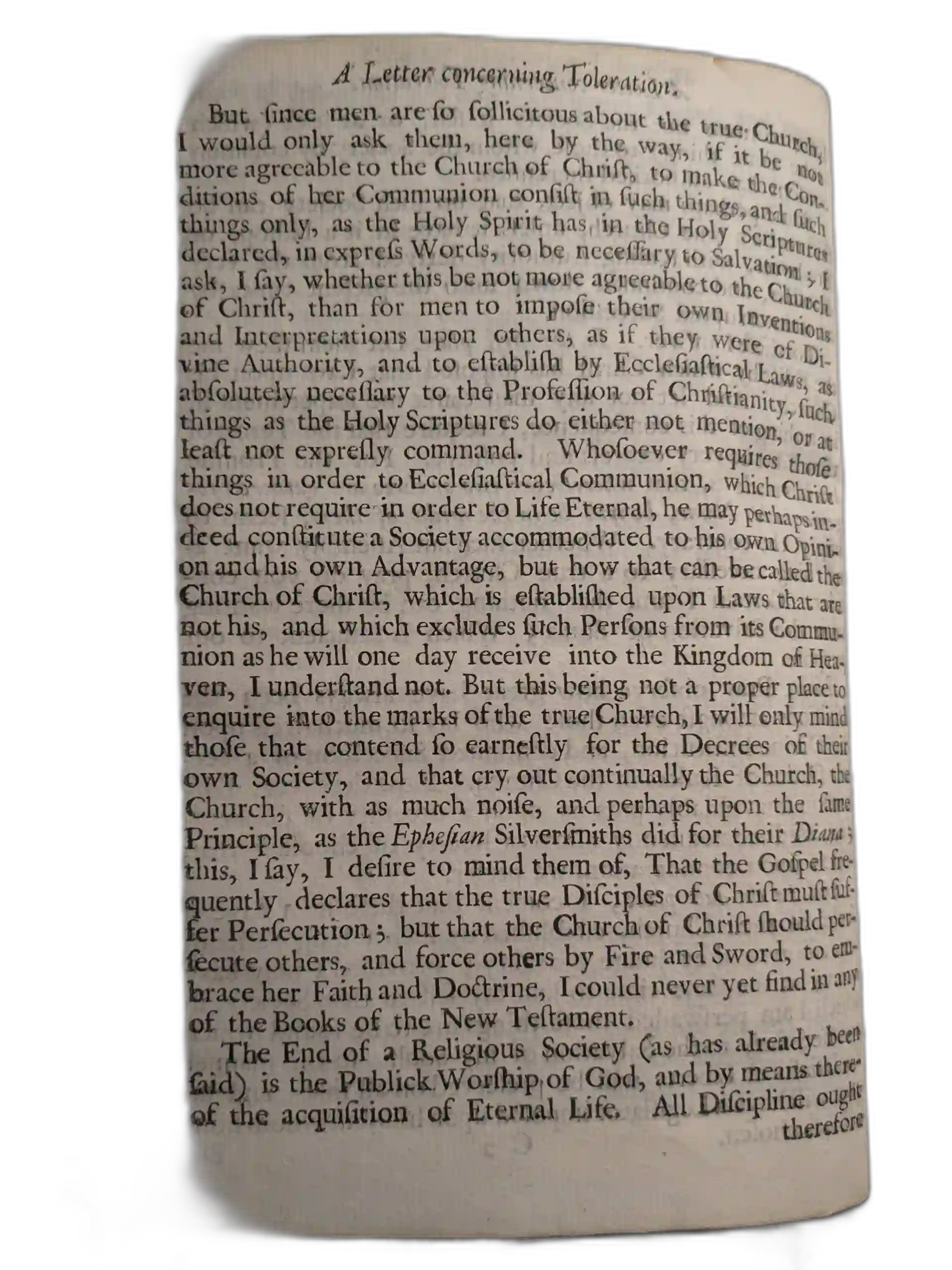
[12]
But since men are so sollicitous about the true Church,
I would only ask them, here by the way, if it be not
more agreeable to the Church of Christ, to make the Con-
ditions of her Communion consist in such things, and such
things only, as the Holy Spirit has in the Holy Scriptures
declared, in express Words, to be necessary to Salvation; I
ask, I say, whether this be not more agreeable to the Church
of Christ, than for men to impose their own Inventions
and Interpretations upon others, as if they were of Di-
vine Authority, and to establish by Ecclesiastical Laws, as
absolutely necessary to the Profession of Christianity, such
things as the Holy Scriptures do either not mention, or at
least not expresly command. Whosoever requires those
things in order to Ecclesiastical Communion, which Christ
does not require in order to Life Eternal, he may perhaps in-
deed constitute a Society accommodated to his own Opini-
on and his own Advantage, but how that can be called the
Church of Christ, which is established upon Laws that are
not his, and which excludes such Persons from its Commu-
nion as he will one day receive into the Kingdom of Hea-
ven, I understand not. But this being not a proper place to
enquire into the marks of the true Church, I will only mind
those that contend so earnestly for the Decrees of their
own Society, and that cry out continually the Church, the
Church, with as much noise, and perhaps upon the same
Principle, as the Ephesian Silversmiths did for their Diana ;
this, I say, I desire to mind them of, That the Gospel fre-
quently declares that the true Disciples of Christ must suf-
fer Persecution; but that the Church of Christ should per-
secute others, and force others by Fire and Sword, to em-
brace her Faith and Doctrine, I could never yet find in any
of the Books of the New Testament.
The End of a Religious Society (as has already been
said) is the Publick Worship of God, and by means there-
of the acquisition of Eternal Life. All Discipline ought
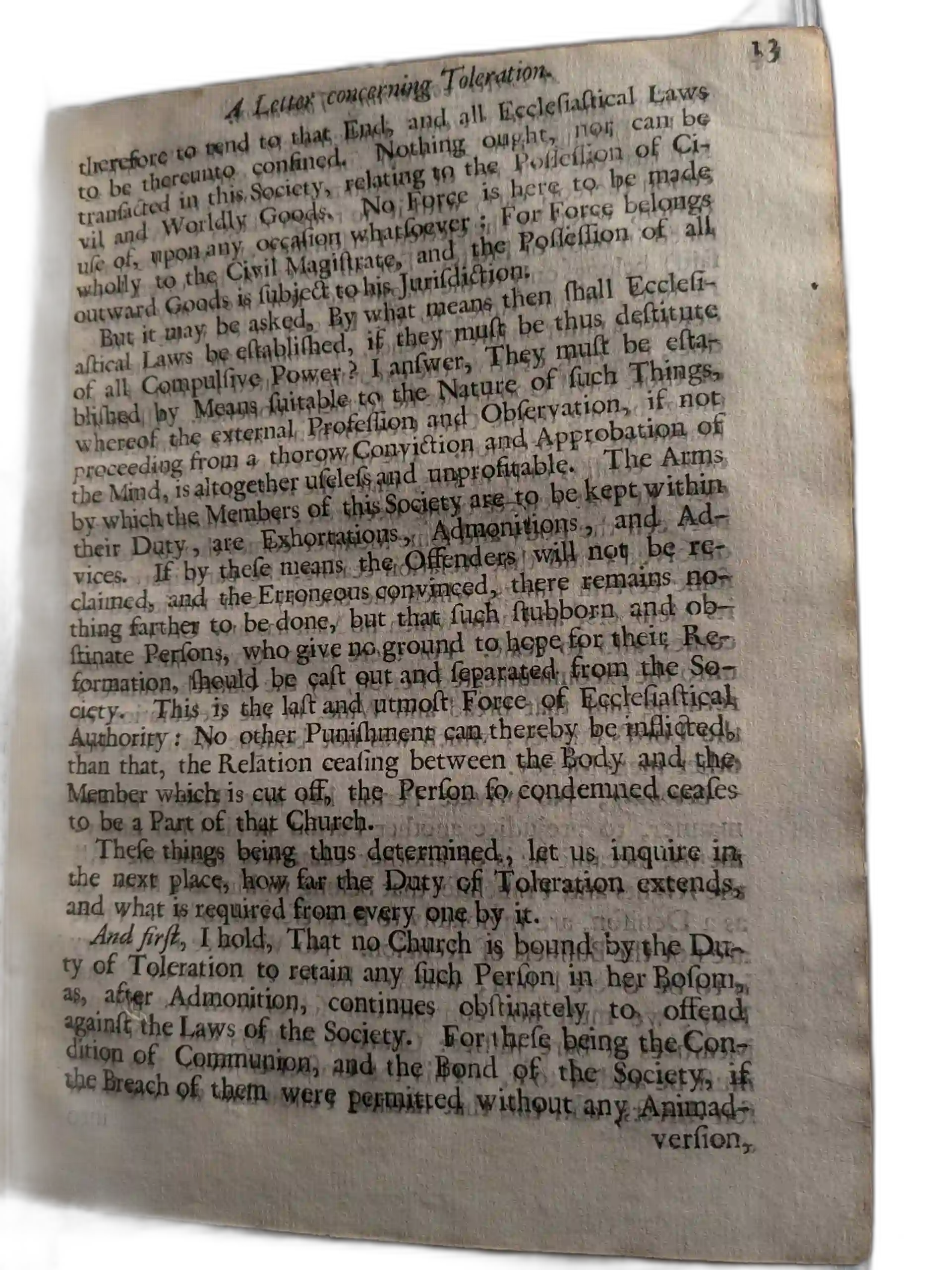
[13]
therefore to tend to that End, and all Ecclesiastical Laws
to be thereunto confined. Nothing ought, nor can be
transacted in this Society, relating to the Possession of Ci-
vil and Worldly Goods. No Force is here to be made
use of, upon any occasion whatsoever: For Force belongs
wholly to the Civil Magistrate, and the Possession of all
outward Goods is subject to his Jurisdiction.
But it may be asked, By what means then shall Ecclesi-
astical Laws be established, if they must be thus destitute
of all Compulsive Power? I answer, They must be esta-
blished by Means suitable to the Nature of such Things,
whereof the external Profession and Observation, if not
proceeding from a thorow Conviction and Approbation of
the Mind, is altogether useless and unprofitable. The Arms
by which the Members of this Society are to be kept within
their Duty, are Exhortations, Admonitions, and Ad-
vices. If by these means the Offenders will not be re-
claimed, and the Erroneous convinced, there remains no-
thing farther to be done, but that such stubborn and ob-
stinate Persons, who give no ground to hope for their Re-
formation, should be cast out and separated from the So-
ciety. This is the last and utmost Force of Ecclesiastical
Authority: No other Punishment can thereby be inflicted,
than that, the Relation ceasing between the Body and the
Member which is cut off, the Person so condemned ceases
to be a Part of that Church.
These things being thus determined, let us inquire in
the next place, how far the Duty of Toleration extends,
and what is required from every one by it.
And first, I hold, That no Church is bound by the Du-
ty of Toleration to retain any such Person in her Bosom,
as, after Admonition, continues obstinately to offend
against the Laws of the Society. For these being the Con-
dition of Communion, and the Bond of the Society, if
the Breach of them were permitted without any Animad-
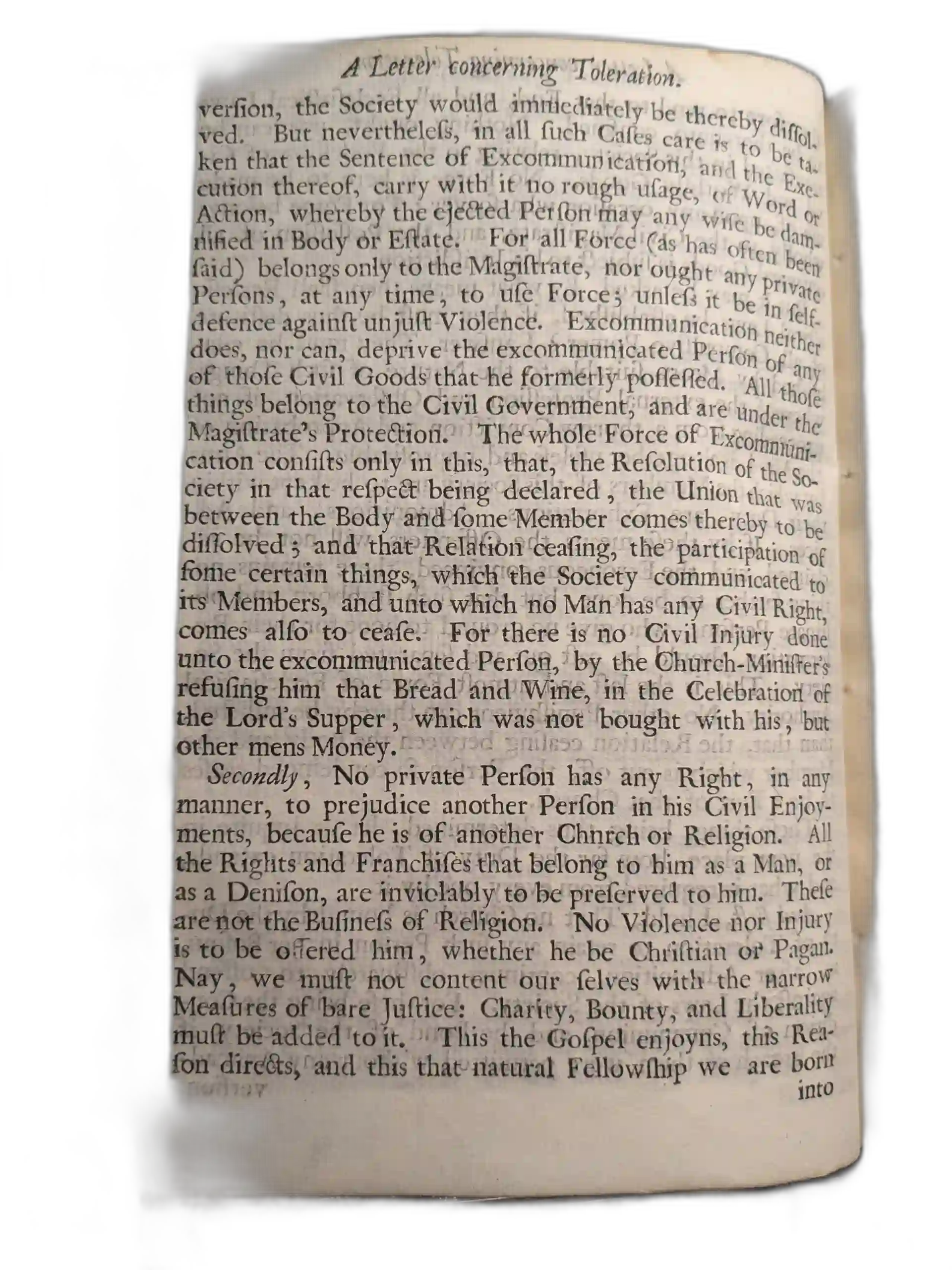
[14]
version, the Society would immediately be thereby dissol-
ved. But nevertheless, in all such Cases care is to be ta-
ken that the Sentence of Excommunication, and the Exe-
cution thereof, carry with it no rough usage, of Word or
Action, whereby the ejected Person may any wise be dam-
nified in Body or Estate. For all Force (as has often been
said) belongs only to the Magistrate, nor ought any private
Persons, at any time, to use Force; unless it be in self-
defence against unjust Violence. Excommunication neither
does, nor can, deprive the excommunicated Person of any
of those Civil Goods that he formerly possessed. All those
things belong to the Civil Government, and are under the
Magistrate’s Protection. The whole Force of Excommuni-
cation consists only in this, that, the Resolution of the So-
ciety in that respect being declared, the Union that was
between the Body and some Member comes thereby to be
dissolved; and that Relation ceasing, the participation of
some certain things, which the Society communicated to
its Members, and unto which no Man has any Civil Right,
comes also to cease. For there is no Civil Injury done
unto the excommunicated Person, by the Church-Minister’s
refusing him that Bread and Wine, in the Celebration of
the Lord’s Supper, which was not bought with his, but
other mens Money.
Secondly, No private Person has any Right, in any
manner, to prejudice another Person in his Civil Enjoy-
ments, because he is of another Church or Religion. All
the Rights and Franchises that belong to him as a Man, or
as a Denison, are inviolably to be preserved to him. These
are not the Business of Religion. No Violence nor Injury
is to be offered him, whether he be Christian or Pagan.
Nay, we must not content our selves with the narrow
Measures of bare Justice: Charity, Bounty, and Liberality
must be added to it. This the Gospel enjoyns, this Rea-
son directs, and this that natural Fellowship we are born
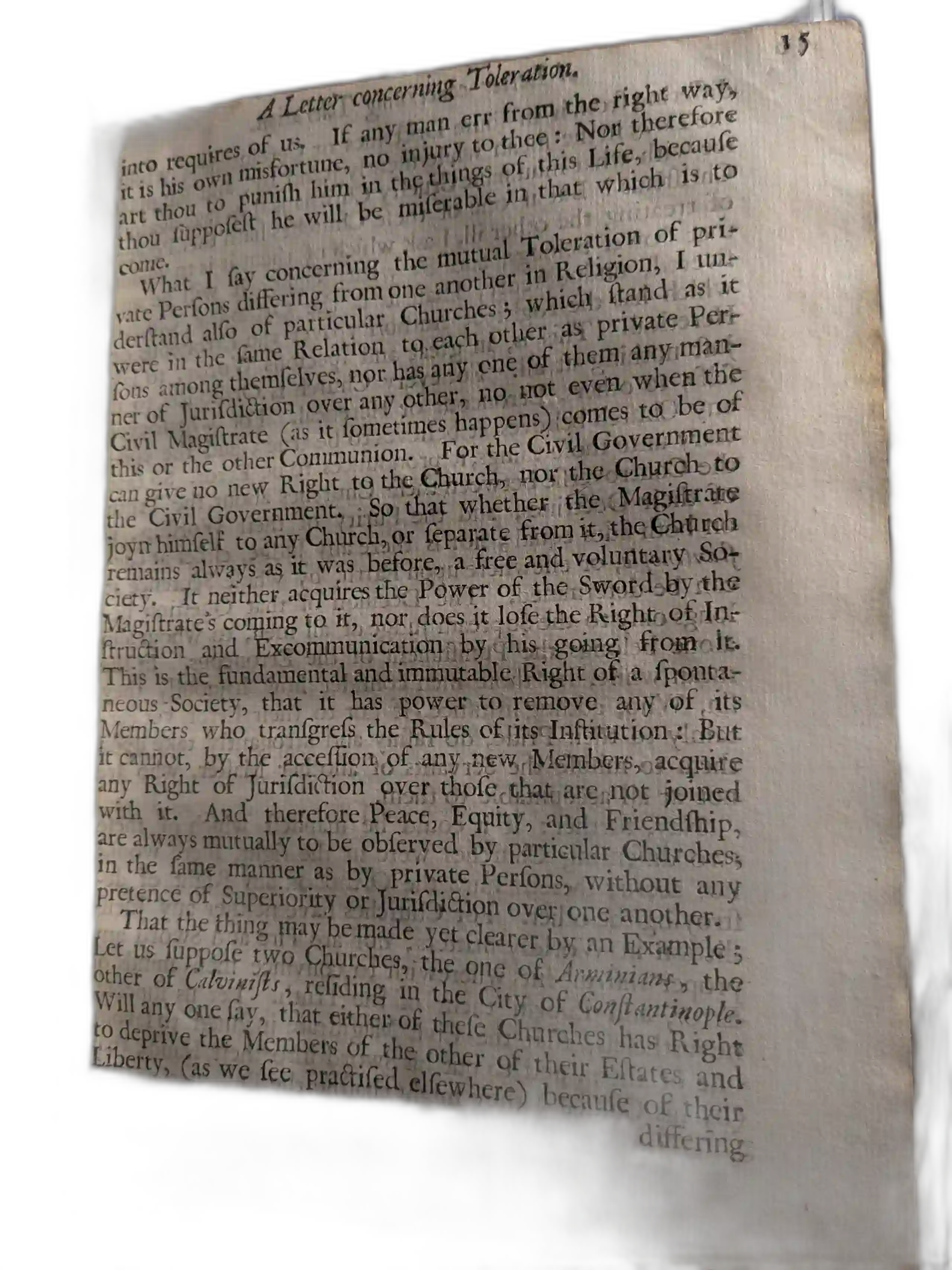
[15]
into requires of us. If any man err from the right way,
it is his own misfortune, no injury to thee: Nor therefore
art thou to punish him in the things of this Life, because
thou supposest he will be miserable in that which is to
come.
What I say concerning the mutual Toleration of pri-
vate Persons differing from one another in Religion, I un-
derstand also of particular Churches; which stand as it
were in the same Relation to each other as private Per-
sons among themselves, nor has any one of them any man-
ner of Jurisdiction over any other, no not even when the
Civil Magistrate (as it sometimes happens) comes to be of
this or the other Communion. For the Civil Government
can give no new Right to the Church, nor the Church to
the Civil Government. So that whether the Magistrate
joyn himself to any Church, or separate from it, the Church
remains always as it was before, a free and voluntary So-
ciety. It neither acquires the Power of the Sword by the
Magistrate’s coming to it, nor does it lose the Right of In-
struction and Excommunication by his going from it.
This is the fundamental and immutable Right of a sponta-
neous Society, that it has power to remove any of its
Members who transgress the Rules of its Institution: But
it cannot, by the accession of any new Members, acquire
any Right of Jurisdiction over those that are not joined
with it. And therefore Peace, Equity, and Friendship,
are always mutually to be observed by particular Churches,
in the same manner as by private Persons, without any
pretence of Superiority or Jurisdiction over one another.
That the thing may be made yet clearer by an Example;
Let us suppose two Churches, the one of Arminians, the
other of Calvinists, residing in the City of Constantinople.
Will any one say, that either of these Churches has Right
to deprive the Members of the other of their Estates and
Liberty, (as we see practised elsewhere) because of their
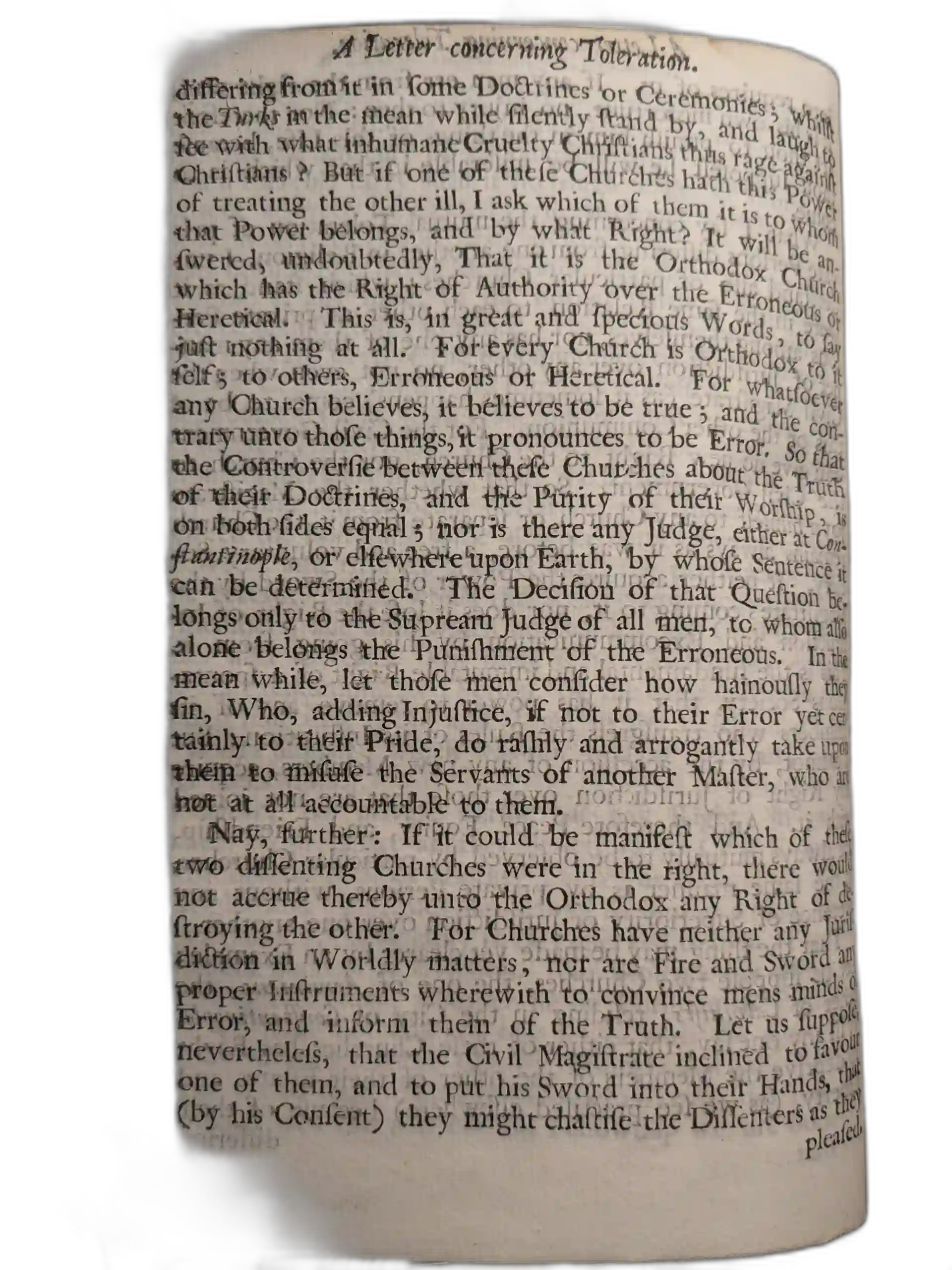
[16]
differing from it in some Doctrines or Ceremonies; whilst
the Turks in the mean while silently stand by, and laugh to
see with what inhumane Cruelty Christians thus rage against
Christians? But if one of these Churches hath this Power
of treating the other ill, I ask which of them it is to whom
that Power belongs, and by what Right? It will be an-
swered, undoubtedly, That it is the Orthodox Church
which has the Right of Authority over the Erroneous or
Heretical. This is, in great and specious Words, to say
just nothing at all. For every Church is Orthodox to it
self; to others, Erroneous or Heretical. For whatsoever
any Church believes, it believes to be true; and the con-
trary unto those things, it pronounces to be Error. So that
the Controversie between these Churches about the Truth
of their Doctrines, and the Purity of their Worship, is
on both sides equal; nor is there any Judge, either at Con-
stantinople, or elsewhere upon Earth, by whose Sentence it
can be determined. The Decision of that Question be-
longs only to the Supream Judge of all men, to whom also
alone belongs the Punishment of the Erroneous. In the
mean while, let those men consider how hainously they
sin, Who, adding Injustice, if not to their Error yet cer-
tainly to their Pride, do rashly and arrogantly take upon
them to misuse the Servants of another Master, who are
not at all accountable to them.
Nay, further: If it could be manifest which of these
two dissenting Churches were in the right, there would
not accrue thereby unto the Orthodox any Right of de-
stroying the other. For Churches have neither any Juris-
diction in Worldly matters, nor are Fire and Sword any
proper Instruments wherewith to convince mens minds of
Error, and inform them of the Truth. Let us suppose,
nevertheless, that the Civil Magistrate inclined to favour
one of them, and to put his Sword into their Hands, that
(by his Consent) they might chastise the Dissenters as they
References
Collections
Tags
Footnotes
- *Matth. 18. 20.